News
Agency News Items - 2018
December
Texas Oil and Gas Production Statistics for October 2018
December 20, 2018
AUSTIN –– Production for October 2018 as reported to the Railroad Commission of Texas (Commission) is 89,719,771 barrels of crude oil and 601,079,149 mcf (thousand cubic feet) of total gas from oil and gas wells. These preliminary figures are based on production volumes reported by operators and will be updated as late and corrected production reports are received. Production reported to the Commission for October 2017, was: 75,645,972 barrels of crude oil preliminarily, updated to a current figure of 99,667,957 barrels; and 540,197,160 mcf of total gas preliminarily, updated to a current figure of 709,552,593 mcf.
The Commission reports that from November 2017 to October 2018, total Texas reported production was 1.24 billion barrels of crude oil and 8.3 trillion cubic feet of total gas. Crude oil production reported by the Commission is limited to oil produced from oil leases and does not include condensate, which is reported separately by the Commission.
Texas preliminary October 2018 crude oil production averaged 2,894,186 barrels daily, compared to the 2,440,193 barrels daily average of October 2017.
Texas preliminary October 2018 total gas production averaged 19,389,650 mcf a day, compared to the 17,425,715 mcf daily average of October 2017.
Texas production in October 2018 came from 179,119 oil wells and 90,915 gas wells.
TABLE 1 – OCTOBER 2018 TEXAS TOP TEN CRUDE OIL PRODUCING COUNTIES RANKED BY PRELIMINARY PRODUCTIONRANK
COUNTY
CRUDE OIL (BBLS)
1.
MIDLAND
11,540,757
2.
KARNES
7,319,781
3.
REEVES
5,806,504
4.
MARTIN
5,485,844
5.
UPTON
4,832,528
6.
DE WITT
4,799,660
7.
LOVING
4,744,458
8.
HOWARD
3,963,515
9.
LA SALLE
3,917,768
10.
GLASSCOCK
3,013,978
TABLE 2 – OCTOBER 2018 TEXAS TOP TEN TOTAL GAS (GAS WELL GAS & CASINGHEAD) PRODUCING COUNTIES RANKED BY PRELIMINARY PRODUCTIONRANK
COUNTY
TOTAL GAS (MCF)
1.
REEVES
37,157,842
2.
WEBB
35,865,546
3.
TARRANT
35,404,055
4.
MIDLAND
27,102,709
5.
KARNES
25,293,524
6.
DE WITT
23,721,765
7.
PANOLA
23,025,250
8.
LOVING
20,921,817
9.
CULBERSON
19,771,536
10.
UPTON
15,764,386
TABLE 3 – OCTOBER 2018 TEXAS TOP TEN TOTAL CONDENSATE PRODUCING COUNTIES RANKED BY PRELIMINARY PRODUCTIONRANK
COUNTY
CONDENSATE (BBLS)
1.
REEVES
2,294,216
2.
CULBERSON
1,785,103
3.
LOVING
1,323,067
4.
KARNES
1,281,602
5.
DE WITT
895,327
6.
WEBB
636,151
7.
LIVE OAK
279,457
8.
DIMMIT
227,626
9.
WHEELER
171,741
10.
LA SALLE
158,345
Railroad Commission of Texas Presents 2018 Year in Review
December 19, 2018
AUSTIN –The Railroad Commission of Texas today released its 2018 Year in Review highlighting the regulatory agency’s accomplishments during the past year. The Year in Review reflects significant milestones, exciting changes and a continuing commitment to protecting public safety and our natural resources while maintaining a strong regulatory environment.
During 2018, the Commission conducted hundreds of thousands of inspections, assessed more than $9.2 million in fines on 3,475 enforcement dockets, continued Information Technology modernization efforts, surpassed key legislative performance measures and increased staff training. The 2018 Year in Review details these accomplishments and includes video, photos, infographics and links to additional information. The Year in Review can be found here.
The Commission regulates oil and gas exploration and production, pipeline safety, surface mining, natural gas utilities and alternative fuels.
The Railroad Commission encourages everyone to share the 2018 Year in Review using the hashtag #TxRRC.
RRC Assesses More than $9 Million in Fines in 2018
December 13, 2018
AUSTIN – The Railroad Commission of Texas assessed $9,249,026 in fines on 3,475 enforcement dockets involving the state’s oil and gas industry and intrastate pipeline safety for calendar year 2018.
These include:- $76,603 in fines assessed in protested dockets that went to hearing and related to pipeline damage and oil and gas violations;
- $3,226,261 in penalties for Master Default Orders;
- $1,893,557 in fines for Master Agreed Orders; and;
- $4,052,605 for Pipeline Damage Prevention penalties.
Totals include the Commission’s final enforcement actions for 2018, taken Tuesday during the last Commissioners’ conference of the year. On Tuesday, operators were ordered to come into compliance with Commission rules and assessed $120,590 for oil and gas, LP-Gas and pipeline safety rule violations. Pipeline operators and excavators were assessed $275,605 for violations of the Commission’s Pipeline Damage Prevention rules. Details on all these Master Agreed Orders can be found on the RRC website here.
In the absence of timely motions for rehearing, decisions are final as stated in these final orders.
Texas Drilling Permits and Completions Statistics for November 2018
December 07, 2018
AUSTIN –– The Railroad Commission of Texas (Commission) issued a total of 933 original drilling permits in November 2018 compared to 1,187 in November 2017. The November 2018 total included 870 permits to drill new oil or gas wells, one to re-enter plugged well bores and 62 for re-completions of existing well bores. The breakdown of well types for those permits is 212 oil, 55 gas, 595 oil or gas, 60 injection, two service and nine other permits.
In November 2018, Commission staff processed 794 oil, 151 gas, 36 injection and one other completions compared to 388 oil, 74 gas, 29 injection and one other completions in November 2017. Total well completions processed for 2018 year to date are 10,236; up from 6,291 recorded during the same time period in 2017.
According to Baker Hughes Inc., the Texas rig count as of December 7 was 529, representing about 49 percent of all active rigs in the United States.
For additional drilling permit and completion statistics, visit the Commission’s monthly drilling completion summaries web page.TABLE 1 – NOVEMBER 2018 TEXAS OIL AND GAS DRILLING PERMITS AND COMPLETIONS BY RAILROAD COMMISSION OF TEXAS DISTRICT*
DISTRICT
PERMITS TO DRILL OIL/GAS HOLES
NEW OIL COMPLETIONS
NEW GAS COMPLETIONS
(1) SAN ANTONIO AREA
158
87
21
(2) REFUGIO AREA
59
106
14
(3) SOUTHEAST TEXAS
38
28
6
(4) DEEP SOUTH TEXAS
14
2
3
(5) EAST CENTRAL TX
5
7
1
(6) EAST TEXAS
41
9
15
(7B) WEST CENTRAL TX
27
25
1
(7C) SAN ANGELO AREA
64
88
0
(8) MIDLAND
437
374
73
(8A) LUBBOCK AREA
34
24
0
(9) NORTH TEXAS
35
34
4
(10) PANHANDLE
21
10
13
TOTAL
933
794
151
*A district map is available on the Railroad Commission of Texas website.
November
Texas Oil and Gas Production Statistics for September 2018
November 29, 2018
AUSTIN –– Production for September 2018 as reported to the Railroad Commission of Texas (Commission) is 85,096,543 barrels of crude oil and 591,183,972 mcf (thousand cubic feet) of total gas from oil and gas wells. These preliminary figures are based on production volumes reported by operators and will be updated as late and corrected production reports are received. Production reported to the Commission for September 2017, was: 69,238,482 barrels of crude oil preliminarily, updated to a current figure of 91,898,514 barrels; and 519,180,463 mcf of total gas preliminarily, updated to a current figure of 666,600,607 mcf.
The Commission reports that from October 2017 to September 2018, total Texas reported production was 1.209 billion barrels of crude oil and 8.3 trillion cubic feet of total gas. Crude oil production reported by the Commission is limited to oil produced from oil leases and does not include condensate, which is reported separately by the Commission.
Texas preliminary September 2018 crude oil production averaged 2,836,551 barrels daily, compared to the 2,307,949 barrels daily average of September 2017.
Texas preliminary September 2018 total gas production averaged 19,706,132 mcf a day, compared to the 17,306,015 mcf daily average of September 2017.
Texas production in September 2018 came from 179,138 oil wells and 90,974 gas wells.
For additional oil and gas production statistics, visit the Commission’s monthly Oil & Gas production web page.
TABLE 1 – SEPTEMBER 2018 TEXAS TOP TEN CRUDE OIL PRODUCING COUNTIES RANKED BY PRELIMINARY PRODUCTIONRANK
COUNTY
CRUDE OIL (BBLS)
1.
MIDLAND
10,077,280
2.
KARNES
7,060,471
3.
REEVES
5,423,248
4.
MARTIN
5,247,375
5.
DE WITT
4,669,275
6.
UPTON
4,637,689
7.
LA SALLE
4,136,941
8.
LOVING
4,109,511
9.
HOWARD
3,055,610
10.
ANDREWS
2,917,154
TABLE 2 – SEPTEMBER 2018 TEXAS TOP TEN TOTAL GAS (GAS WELL GAS & CASINGHEAD) PRODUCING COUNTIES RANKED BY PRELIMINARY PRODUCTIONRANK
COUNTY
TOTAL GAS (MCF)
1.
WEBB
54,581,000
2.
REEVES
37,207,229
3.
TARRANT
33,973,352
4.
MIDLAND
24,773,580
5.
KARNES
23,506,945
6.
DE WITT
22,473,705
7.
LOVING
18,782,361
8.
PANOLA
18,494,210
9.
CULBERSON
18,482,233
10.
UPTON
15,282,914
TABLE 3 – SEPTEMBER 2018 TEXAS TOP TEN TOTAL CONDENSATE PRODUCING COUNTIES RANKED BY PRELIMINARY PRODUCTIONRANK
COUNTY
CONDENSATE (BBLS)
1.
REEVES
2,646,016
2.
CULBERSON
1,668,349
3.
LOVING
1,246,882
4.
KARNES
1,131,755
5.
DE WITT
961,761
6.
WEBB
749,692
7.
DIMMIT
369,789
8.
LIVE OAK
266,479
9.
HEMPHILL
137,944
10.
LA SALLE
110,298
###
Commissioner Ryan Sitton Addresses North America’s Largest Petrochemical Conference
November 15, 2018
HOUSTON — Texas Railroad Commissioner Ryan Sitton today addressed the Petrochemical Supply Chain and Logistics conference, North America’s largest petrochemical industry gathering. The conference is attended by hundreds of energy industry professionals actively engaged in the petrochemical space.
“Texas’ impact on global energy markets right now cannot be overstated,” Sitton said. “The things happening in Texas oil fields, processing plants and petrochemical facilities are reverberating around the world. For example, between 2011 through 2020, U.S. petrochemical capacity will have grown by 28 million tonnes. And since 2010, 325 projects cumulatively valued at almost $200 billion in capital investment have been announced, many of which are located along the Texas Gulf Coast. As oil and natural gas production continue to rise, more pipelines are built and ports expanded, and more petrochemical facilities start up, American energy is dramatically improving America’s trade deficits and enhancing our economic and national security. Every single Texan should be excited about these developments and Texas’ leadership in the global energy industry,” concluded Sitton.

Above: Commissioner Ryan Sitton pictured with a Petrochemical Supply Chain and Logistics conference attendee.
Ryan Sitton was elected to the Railroad Commission in 2014 and is the first engineer to serve on the Commission in 50 years. Sitton is one of the world’s leading energy experts and founded PinnacleART, an engineering and technology company focused on reliability and integrity programs for the oil, gas, and petrochemical, mining, pharmaceutical, and wastewater industries. As Railroad Commissioner, Sitton uses his technical expertise and business experience to make decisions for the state that are based on sound science and employs a fiscally conservative approach to prioritize the agency’s efforts.
RRC Enforcement Actions Taken at Commissioners’ Nov. 13 Conference
November 14, 2018
AUSTIN – The Railroad Commission of Texas assessed $360,940 in fines involving 198 enforcement dockets against operators and businesses at the Commissioners’ conference this week. The Commission has primary oversight and enforcement of the state’s oil and gas industry and intrastate pipeline safety.
Operators were assessed $114,576 after failing to appear at Commission enforcement proceedings. Details on these Master Default Orders can be found on the RRC website here.
Operators were ordered to come into compliance with Commission rules and assessed $6,989 for oil and gas, LP-Gas and pipeline safety rule violations. Pipeline operators and excavators were assessed $239,375 for violations of the Commission’s Pipeline Damage Prevention rules. Details on all these Master Agreed Orders can be found on the RRC website here.
In the absence of timely motions for rehearing, decisions are final as stated in these final orders.
Texas Drilling Permits and Completions Statistics for October 2018
November 08, 2018
AUSTIN –– The Railroad Commission of Texas (Commission) issued a total of 1,149 original drilling permits in October 2018 compared to 997 in October 2017. The October 2018 total included 1,051 permits to drill new oil or gas wells, 11 to re-enter plugged well bores and 87 for re-completions of existing well bores. The breakdown of well types for those permits is 271 oil, 64 gas, 729 oil or gas, 77 injection, two service and six other permits.
In October 2018, Commission staff processed 987 oil, 170 gas, 49 injection and seven other completions compared to 257 oil, 91 gas, 39 injection and four other completions in October 2017. Total well completions processed for 2018 year to date are 9,254; up from 5,799 recorded during the same time period in 2017.
According to Baker Hughes Inc., the Texas rig count as of November 2 was 533, representing about 50 percent of all active rigs in the United States.
For additional drilling permit and completion statistics, visit the Commission’s monthly drilling completion summaries web page.TABLE 1 – OCTOBER 2018 TEXAS OIL AND GAS DRILLING PERMITS AND COMPLETIONS BY RAILROAD COMMISSION OF TEXAS DISTRICT*
DISTRICT
PERMITS TO DRILL OIL/GAS HOLES
OIL COMPLETIONS
GAS COMPLETIONS
(1) SAN ANTONIO AREA
162
123
33
(2) REFUGIO AREA
106
113
17
(3) SOUTHEAST TEXAS
45
36
3
(4) DEEP SOUTH TEXAS
13
3
11
(5) EAST CENTRAL TX
2
0
1
(6) EAST TEXAS
38
8
14
(7B) WEST CENTRAL TX
25
22
2
(7C) SAN ANGELO AREA
96
109
1
(8) MIDLAND
545
464
71
(8A) LUBBOCK AREA
46
67
0
(9) NORTH TEXAS
53
23
6
(10) PANHANDLE
18
19
11
TOTAL
1,149
987
170
*A district map is available on the Railroad Commission of Texas website.
Railroad Commission Appoints Dana Lewis as Director of Hearings
November 06, 2018
AUSTIN – The Railroad Commission of Texas today announced the appointment of Dana Lewis as Director of Hearings for the agency, effective immediately. Lewis has served as interim director for the division since Sept. 1, 2018. In her new role, Lewis will report to the RRC’s Chief Operating Officer.
“Dana’s legal expertise and long service in state government, including the past two and a half years here at the RRC, make her the best person to lead the Hearings Division,” said RRC Executive Director Wei Wang.
Most recently, Lewis served the RRC as an Administrative Law Judge presiding over gas utility rate cases. Prior to joining the Commission, Lewis served as a Staff Attorney for Judge Stephen Yelenosky, 345th District Court of Travis County from January 2005 to April 2016, and as Staff Attorney for Judge Darlene Byrne, 126th District Court of Travis County from June 2001 to May 2004.
Lewis earned her bachelor’s degree in Political Science from Northwestern State University of Louisiana in 1995 and her Juris Doctorate from the University of Texas at Austin School of Law in 2000.

October
RRC Enforcement Actions Taken at Commissioners’ Oct. 30 Conference
October 31, 2018
AUSTIN – The Railroad Commission of Texas assessed $459,519 in fines involving 172 enforcement dockets against operators and businesses at the Commissioners’ conference this week. The Commission has primary oversight and enforcement of the state’s oil and gas industry and intrastate pipeline safety.
One operator was assessed $20,609 in an oil and gas docket that went to hearing. The final order for Docket 01-0307780 can be found on the RRC website here.
Operators were assessed $201,497 after failing to appear at Commission enforcement proceedings. Details on these Master Default Orders can be found on the RRC website here.
Operators were ordered to come into compliance with Commission rules and assessed $42,088 for oil and gas, LP-Gas and pipeline safety rule violations. Pipeline operators and excavators were assessed $195,325 for violations of the Commission’s Pipeline Damage Prevention rules. Details on all these Master Agreed Orders can be found on the RRC website here.
In the absence of timely motions for rehearing, decisions are final as stated in these final orders.Texas Oil and Gas Production Statistics for August 2018
October 26, 2018
AUSTIN –– Production for August 2018 as reported to the Railroad Commission of Texas (Commission) is 90,367,988 barrels of crude oil and 616,160,091 mcf (thousand cubic feet) of total gas from oil and gas wells. These preliminary figures are based on production volumes reported by operators and will be updated as late and corrected production reports are received. Production reported to the Commission for August 2017 was: 75,178,929 barrels of crude oil preliminarily, updated to a current figure of 90,688,861 barrels; and 583,794,409 mcf of total gas preliminarily, updated to a current figure of 675,733,319 mcf.
The Commission reports that from September 2017 to August 2018, total Texas reported production was 1.186 billion barrels of crude oil and 8.2 trillion cubic feet of total gas. Crude oil production reported by the Commission is limited to oil produced from oil leases and does not include condensate, which is reported separately by the Commission.
Texas preliminary August 2018 crude oil production averaged 2,915,096 barrels daily, compared to the 2,425,127 barrels daily average of August 2017.
Texas preliminary August 2018 total gas production averaged 19,876,132 mcf a day, compared to the 18,832,078 mcf daily average of August 2017.
Texas production in August 2018 came from 180,386 oil wells and 89,819 gas wells.
For additional oil and gas production statistics, visit the Commission’s monthly production web page.
TABLE 1 – AUGUST 2018 TEXAS TOP TEN CRUDE OIL PRODUCING COUNTIES RANKED BY PRELIMINARY PRODUCTIONRANK
COUNTY
CRUDE OIL (BBLS)
1.
MIDLAND
10,656,286
2.
KARNES
7,032,253
3.
MARTIN
5,681,435
4.
REEVES
5,518,296
5.
LOVING
5,291,612
6.
DE WITT
4,856,269
7.
UPTON
4,592,431
8.
LA SALLE
4,292,967
9.
REAGAN
3,519,212
10.
ANDREWS
3,125,845
TABLE 2 – AUGUST 2018 TEXAS TOP TEN TOTAL GAS (GAS WELL GAS & CASINGHEAD) PRODUCING COUNTIES RANKED BY PRELIMINARY PRODUCTIONRANK
COUNTY
TOTAL GAS (MCF)
1.
WEBB
40,592,320
2.
TARRANT
35,762,126
3.
REEVES
33,268,413
4.
MIDLAND
25,579,496
5.
DE WITT
23,969,159
6.
KARNES
23,925,693
7.
LOVING
22,761,066
8.
PANOLA
18,630,958
9.
CULBERSON
17,304,536
10.
REAGAN
17,058,794
TABLE 3 – AUGUST 2018 TEXAS TOP TEN TOTAL CONDENSATE PRODUCING COUNTIES RANKED BY PRELIMINARY PRODUCTION
RANKCOUNTYCONDENSATE (BBLS)1.
REEVES
2,143,918
2.
CULBERSON
1,523,243
3.
LOVING
1,367,466
4.
KARNES
1,231,904
5.
DE WITT
1,066,684
6.
WEBB
659,159
7.
DIMMIT
370,859
8.
LIVE OAK
270,363
9.
LA SALLE
179,137
10.
HEMPHILL
161,471
Commissioner Ryan Sitton Highlights Global Impact of Permian Basin Oil Boom at PBPA Annual Meeting
October 25, 2018
MIDLAND — Texas Railroad Commissioner Ryan Sitton opened the Permian Basin Petroleum Association Annual Meeting today with an overview of how the record oil production of the region is positioning Texas as a global energy leader.
“Permian Basin output has positioned America to be a global leader in energy production,” Sitton said. “Oil and gas production in the Permian has grown exponentially over the last few years, bringing with it unprecedented job growth and revenue for the State of Texas. It is dramatically improving America’s economic strength and national security, and I think that is something every Texan can get excited about.”
Sitton also addressed the need for more investments in pipeline capacity and in improving Gulf Coast ports to handle the increase in global export demand.
The PBPA Annual Meeting brings together industry and government leaders to discuss key issues facing oil and natural gas production in the Permian Basin region. Topics discussed included the upcoming Texas Legislative Session, takeaway capacity, and the regulatory environment.

Above: Commissioner Ryan Sitton delivering the opening keynote at the 2018 Permian Basin Petroleum Association Annual Meeting on October 25, 2018.
Ryan Sitton was elected to the Railroad Commission in 2014 and is the first engineer to serve on the Commission in 50 years. Sitton is one of the world’s leading energy experts and founded PinnacleART, an engineering and technology company focused on reliability and integrity programs for the oil, gas, and petrochemical, mining, pharmaceutical, and wastewater industries. As Railroad Commissioner, Sitton uses his technical expertise and business experience to make decisions for the state that are based on sound science and employs a fiscally conservative approach to prioritize the agency’s efforts.RRC Enforcement Actions Taken at Commissioners’ Oct. 16 Conference
October 18, 2018
AUSTIN – The Railroad Commission of Texas assessed $593,126 in fines involving 197 enforcement dockets against operators and businesses at the Commissioners’ conference this week. The Commission has primary oversight and enforcement of the state’s oil and gas industry and intrastate pipeline safety.
Operators were assessed $315,280 after failing to appear at Commission enforcement proceedings. Details on these Master Default Orders can be found on the RRC website here.
Operators were ordered to come into compliance with Commission rules and assessed $82,971 for oil and gas, LP-Gas and pipeline safety rule violations. Pipeline operators and excavators were assessed $194,875 for violations of the Commission’s Pipeline Damage Prevention rules. Details on all these Master Agreed Orders can be found on the RRC website here.
In the absence of timely motions for rehearing, decisions are final as stated in these final orders.
Commissioner Christian Hosts 86th Legislature Energy Summit
October 16, 2018
AUSTIN – Railroad Commissioner Wayne Christian, on Monday, hosted the 86th Legislature Energy Summit -- a day long educational forum featuring in-depth discussion and analysis on critical issues facing the energy sector in Texas.
The Summit was held at the Texas Public Policy Foundation and kicked off with a panel discussion on ‘Energy and its Impact on Texas’ featuring Railroad Commission (RRC) Executive Director Wei Wang, Senator Bryan Hughes (R – Mineola), and moderator, Texas Oil and Gas Association President and former Agriculture Commissioner Todd Staples.
This panel focused on the enormous impact the oil and gas industry has on our state’s budget, economy, and job growth. Across ten oil and gas-related sectors of our economy, the oil and gas industry is responsible for approximately 30 percent of the state economy and pays $11 billion a year in state taxes, local taxes, and royalty payments.
Director Wang noted the enormous gains the RRC had made with the resources appropriated to the agency last session. “We were able to exceed our performance measure of 979 and plug 1,440 abandoned wells, while our Oil and Gas Division reduced the processing time for drilling permit applications from seven days at the beginning of the year to set a record of under two business days in the last quarter.”
The second panel, ‘Energy Education & Workforce Development’ featured Representative Jason Isaac (R – Dripping Springs), Glynis Straus (Conoco Phillips), Dave Bowman (Knowledge Vine), and Jimmy Glotfelty (Quanta). Speakers discussed the unique opportunities a career in STEM (science, technology, engineering, mathematics) can provide for individuals of all education levels from certifications to advanced degrees in engineering.
Commissioner Christian gave the lunch keynote address, where his remarks focused on future challenges, recent innovations and finds, and the path to energy dominance and national security.
“The impact of our recent boom goes far beyond the economic flourishment we have seen in Texas, our energy dominance is literally changing the structure of power worldwide and giving us national security,” said Christian.
After lunch, Texas Alliance of Energy Producers President John Tintera led the discussion ‘Modern Environmentalism & Politicized Science’ featuring Commissioner Wayne Christian, Jacki Pick (Host, The Jacki Daily Show), and Allen Gilmer (Former Chairman, Texas Independent Producers and Royalty Owners Association). On this panel, speakers emphasized how modern environmentalism has shifted from a positive force of protecting the environment, preserving natural resources, and protecting the property of our friends and neighbors to a movement instead more focused on dismantling energy produced by fossil fuels domestically in the United States.
“Climate change activism only has an impact on countries that are free, you don’t see the Sierra Club showing up in the Sudan or Tehran, so these countries are never going to make good on their promises to the United Nations because they don’t have to and there is no enforcement mechanism,” said Jacki Pick. “It is only the free countries that will suffer under these policies, whether it is erosion of our sovereignty, redistribution of wealth, or erosion of our energy security.”
The final panel, ‘Subsidies: Good or Bad for Texas’ featured moderator Allen Gilmer and panelists, Rep. Mike Lang (R – Granbury), Cutter Gonzalez (Texas Public Policy Foundation), and Saurabh Sharma (Young Conservatives of Texas). On this panel, they discussed whether society should subsidize energy and what constitutes a subsidy.
“I’m not opposed to wind and solar, I am just opposed to picking winners and losers and our taxes being used to take care of their industry,” said Rep. Mike Lang.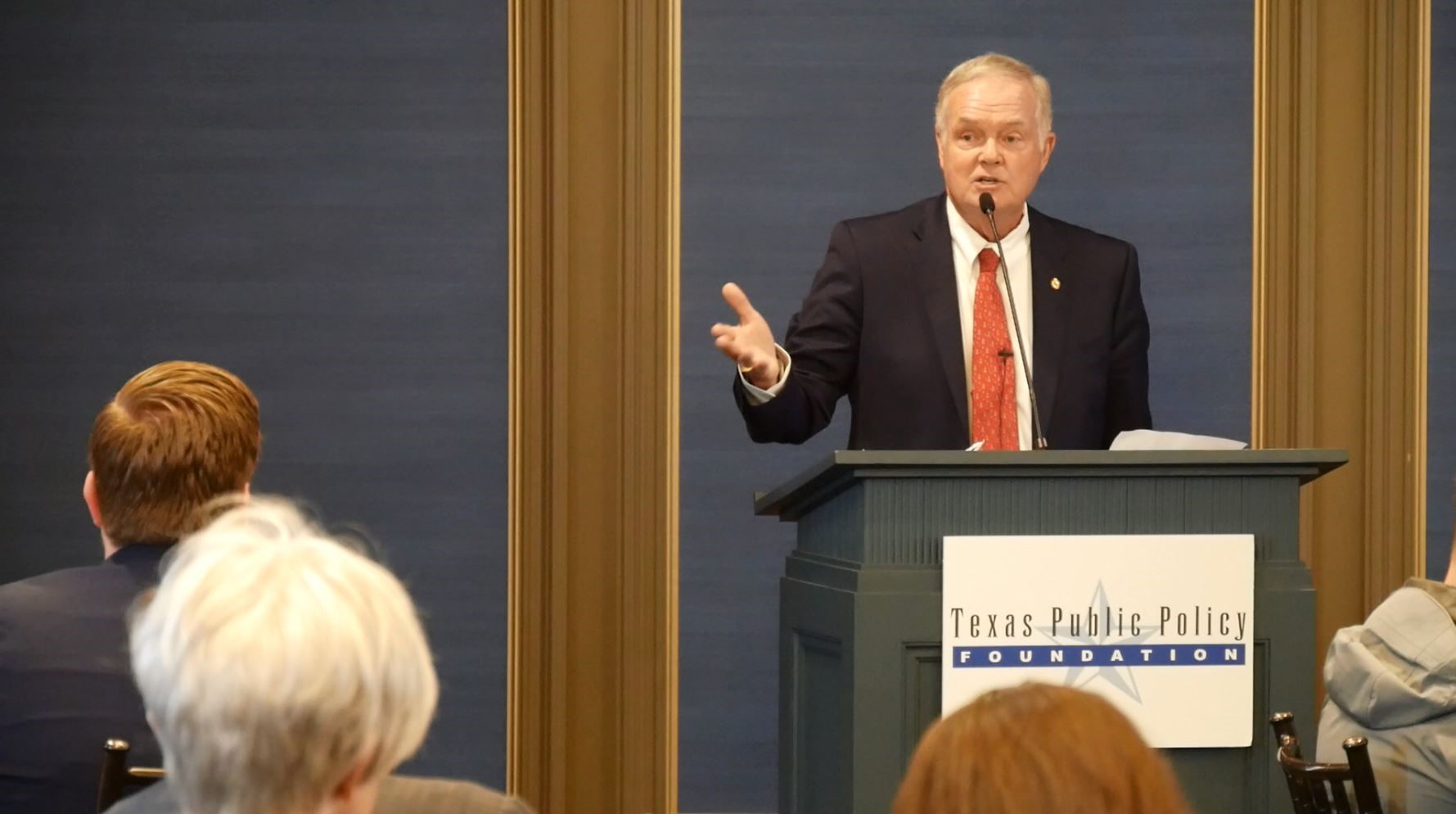
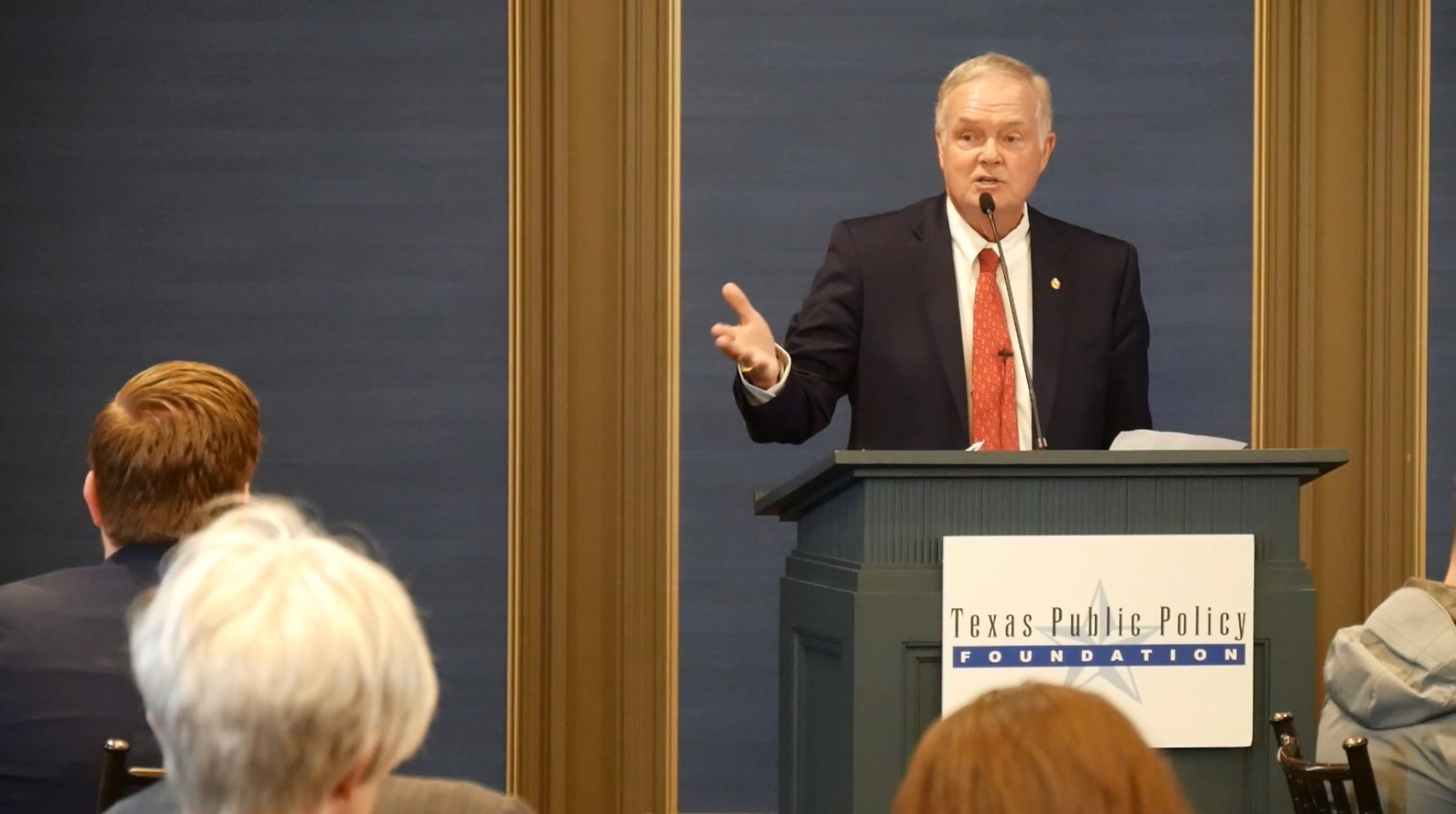
Comm Christian discusses the massive impact domestic energy production in Texas has had on our economy and national security.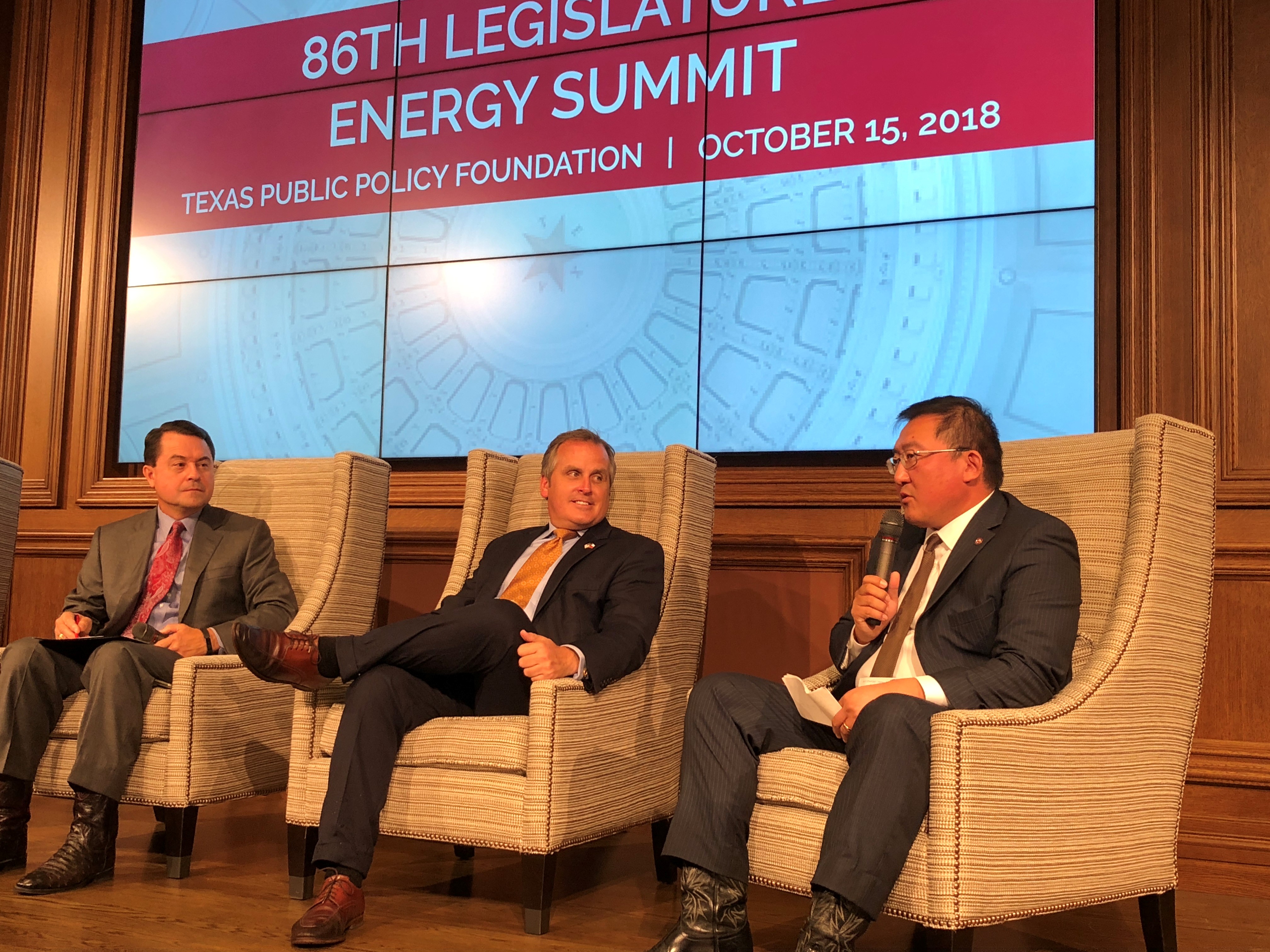 RRC Executive Director Wei Wang (far right) discusses the enormous gains the RRC had made with the resources appropriated to the agency last session.
RRC Executive Director Wei Wang (far right) discusses the enormous gains the RRC had made with the resources appropriated to the agency last session.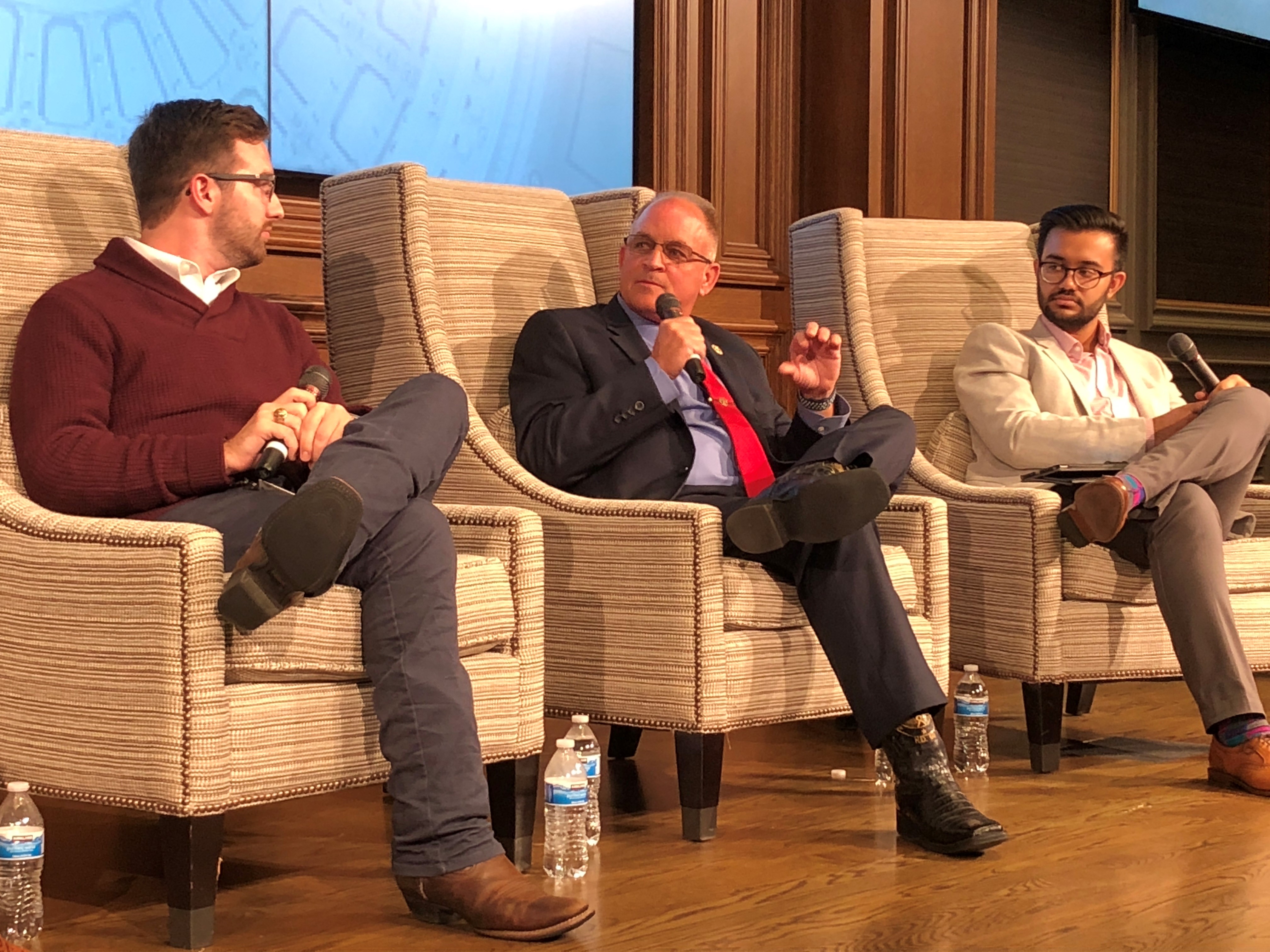 Rep. Mike Lang (Center) discusses the subsidization of energy and its impact on his constituents.
Rep. Mike Lang (Center) discusses the subsidization of energy and its impact on his constituents.A lifelong conservative businessman, Wayne Christian was elected as our 50th Texas Railroad Commissioner in November 2016. Prior to his time at the Commission, Christian served seven Sessions in the Texas House of Representatives, accumulating a strong record of standing for free markets and against burdensome regulations. In addition to his duties as Commissioner, Christian was appointed by Governor Greg Abbott to serve as the Official Representative of Texas on the Interstate Oil and Gas Compact Commission. Christian is married to his wife, Lisa, and together they have three daughters, Liza, Lindsey and Lauren.
Railroad Commission of Texas Announces New Director of Government Relations
October 15, 2018
AUSTIN – The Railroad Commission of Texas today announced Jeremy Mazur joins the agency as the Director of Government Relations, effective Oct. 15, 2018. Mazur most recently served as Deputy Chief of Staff and Legislative Director in the Office of Texas Sen. Van Taylor.
“We’re extremely fortunate to have someone with Jeremy’s experience and expertise in state government join our team,” said RRC Executive Director Wei Wang. “Jeremy has served our state for nearly two decades and brings a breadth and depth of both policy and budget knowledge to the agency that will be invaluable when working with state leadership and the Legislature.”
Mazur has previously served as Director of Government Relations for the Texas Water Development Board and as a Policy Analyst with the Texas Sunset Advisory Commission. In addition, he's held senior leadership positions in the offices of Texas House of Representatives’ members.
“I’m deeply honored and genuinely excited to join the team at the Railroad Commission,” said Mazur. “The Commission has a history unmatched in Texas government, and the agency remains vital to the economic success of our great state by ensuring safe, responsible energy production.”
Mazur earned his Bachelor of Arts from Claremont McKenna College, and holds a Master of Public Affairs from the Lyndon B. Johnson School of Public Affairs at the University of Texas at Austin.

Chairman Craddick Emphasizes Balance in Managing Environment, Energy Growth
October 11, 2018
AUSTIN – Railroad Commission Chairman Christi Craddick today spoke to the Texas Land and Mineral Owners Association (TLMA) at their statewide members meeting in San Antonio about the common sense regulatory approach necessary to protect Texas land and water resources and the land and mineral rights of all Texans as the state’s energy industry continues to grow.
“The Railroad Commission and Texas land and mineral owners agree that the great economic gains generated from oil and gas production in Texas are meaningless without the health and safety of our citizens and environment,” Craddick said. “In Texas, we know that economic growth and environmental protection are not mutually exclusive. The Railroad Commission, industry and the public have worked together to achieve balanced policies that benefit our state and protect our communities and natural resources. Together, we will ensure our state’s long-term energy growth and overall success.”
TLMA is a nonpartisan association of Texas land and mineral owners that engages in direct advocacy to achieve a business and legal environment that promotes a healthy oil and gas industry in Texas by ensuring that the rights of mineral and surface owners are protected; a reduction in litigation; and, the protection of groundwater resources.
Christi Craddick was elected statewide by the people of Texas in November 2012 to serve a six-year term as Texas Railroad Commissioner. A native of Midland, Christi is an attorney specializing in oil and gas, water, tax issues, electric deregulation and environmental policy.
Texas Drilling Permits and Completions Statistics for September 2018
October 08, 2018
AUSTIN –– The Railroad Commission of Texas (Commission) issued a total of 974 original drilling permits in September 2018 compared to 903 in September 2017. The September 2018 total included 857 permits to drill new oil or gas wells, 11 to re-enter plugged well bores and 106 for re-completions of existing well bores. The breakdown of well types for those permits is 271 oil, 55 gas, 576 oil or gas, 62 injection, zero service and 10 other permits.
In September 2018, Commission staff processed 553 oil, 129 gas, 60 injection and two other completions compared to 318 oil, 101 gas, 40 injection and four other completions in September 2017. Total well completions processed for 2018 year to date are 8,041; up from 5,408 recorded during the same time period in 2017.
According to Baker Hughes Inc., the Texas rig count as of October 5 was 524, representing about 51 percent of all active rigs in the United States.
For additional drilling permit and completion statistics, visit the Commission’s monthly drilling completion and plugging summaries web page.
TABLE 1 – SEPTEMBER 2018 TEXAS OIL AND GAS DRILLING PERMITS AND COMPLETIONS BY RAILROAD COMMISSION OF TEXAS DISTRICT*DISTRICT
PERMITS TO DRILL OIL/GAS HOLES
OIL COMPLETIONS
GAS COMPLETIONS
(1) SAN ANTONIO AREA
102
75
12
(2) REFUGIO AREA
76
57
20
(3) SOUTHEAST TEXAS
48
15
15
(4) DEEP SOUTH TEXAS
21
4
14
(5) EAST CENTRAL TX
5
3
2
(6) EAST TEXAS
38
7
21
(7B) WEST CENTRAL TX
24
10
1
(7C) SAN ANGELO AREA
77
64
1
(8) MIDLAND
469
262
35
(8A) LUBBOCK AREA
55
33
0
(9) NORTH TEXAS
42
18
5
(10) PANHANDLE
17
5
3
TOTAL
974
553
129
September
Chairman Craddick Highlights Growing Energy Revenues for Tax Association
September 28, 2018
AUSTIN – Railroad Commission Chairman Christi Craddick today addressed the current and future outlook of the Texas energy industry and its economic impact to the state at the Texas Taxpayers and Research Association (TTARA) annual meeting in Austin.
“The energy industry supports nearly one-third of our state’s economy, generating approximately $30 million a day. This revenue is critical in helping fund important services for Texans, such as public schools, public safety, and roads,” Craddick said. “Thanks to Texas’ incredible energy growth over the last year, the Rainy Day Fund is forecast to hold a balance of $11.9 billion by end of fiscal 2019, the largest ending balance in the fund’s history.
“The industry’s ability to innovate has made Texas the most profitable region in the world for energy development,” Craddick said. “And, the Railroad Commission’s pro-business regulatory structure drives companies to choose to do business in our state creating jobs, creating prosperity and ensuring Texas remains at the forefront of global oil and gas production for the foreseeable future.”
TTARA is a non-profit organization of businesses and individuals from a range of economic sectors and activities in Texas who are interested in state and local fiscal policies, and the way those policies impact the state’s economy.
Christi Craddick was elected statewide by the people of Texas in November 2012 to serve a six-year term as Texas Railroad Commissioner. A native of Midland, Christi is an attorney specializing in oil and gas, water, tax issues, electric deregulation and environmental policy.
Texas Oil and Gas Production Statistics for July 2018
September 25, 2018
AUSTIN –– Production for July 2018 as reported to the Railroad Commission of Texas (Commission) is 90,026,566 barrels of crude oil and 612,512,811 mcf (thousand cubic feet) of total gas from oil and gas wells. These preliminary figures are based on production volumes reported by operators and will be updated as late and corrected production reports are received. Production reported to the Commission for July 2017, was: 75,312,470 barrels of crude oil preliminarily, updated to a current figure of 93,229,013 barrels; and 534,777,620 mcf of total gas preliminarily, updated to a current figure of 692,430,204 mcf.
The Commission reports that from August 2017 to July 2018, total Texas reported production was 1.164 billion barrels of crude oil and 8.1 trillion cubic feet of total gas. Crude oil production reported by the Commission is limited to oil produced from oil leases and does not include condensate, which is reported separately by the Commission.
Texas preliminary July 2018 crude oil production averaged 2,904,083 barrels daily, compared to the 2,429,435 barrels daily average of July 2017.
Texas preliminary July 2018 total gas production averaged 19,758,478 mcf a day, compared to the 17,250,891 mcf daily average of July 2017.
Texas production in July 2018 came from 180,434 oil wells and 91,025 gas wells.
For additional oil and gas production statistics, visit the Commission’s monthly Oil & Gas production web page.TABLE 1 – JULY 2018 TEXAS TOP TEN CRUDE OIL PRODUCING COUNTIES RANKED BY PRELIMINARY PRODUCTION
RANK
COUNTY
CRUDE OIL (BBLS)
1.
MIDLAND
9,696,117
2.
KARNES
6,901,914
3.
REEVES
5,503,464
4.
MARTIN
5,427,424
5.
LOVING
4,874,476
6.
UPTON
4,309,913
7.
LA SALLE
4,109,238
8.
DE WITT
3,877,287
9.
REAGAN
3,395,972
10.
HOWARD
3,301,444
TABLE 2 – JULY 2018 TEXAS TOP TEN TOTAL GAS (GAS WELL GAS & CASINGHEAD) PRODUCING COUNTIES RANKED BY PRELIMINARY PRODUCTIONRANK
COUNTY
TOTAL GAS (MCF)
1.
WEBB
55,657,416
2.
REEVES
37,384,655
3.
TARRANT
34,944,062
4.
KARNES
24,621,479
5.
MIDLAND
23,840,428
6.
DE WITT
20,307,958
7.
PANOLA
20,268,432
8.
LOVING
20,135,855
9.
REAGAN
17,866,415
10.
CULBERSON
16,477,770
TABLE 3 – JULY 2018 TEXAS TOP TEN TOTAL CONDENSATE PRODUCING COUNTIES RANKED BY PRELIMINARY PRODUCTIONRANK
COUNTY
CONDENSATE (BBLS)
1.
REEVES
2,638,387
2.
CULBERSON
1,449,901
3.
KARNES
1,193,184
4.
DE WITT
1,147,599
5.
LOVING
1,146,651
6.
WEBB
685,661
7.
DIMMIT
300,783
8.
LIVE OAK
261,638
9.
HEMPHILL
149,011
10.
LA SALLE
137,359
Commissioner Ryan Sitton Highlights Texas’ Global Energy Impact at Gulf Coast Industry Forum
September 20, 2018
PASADENA — Texas Railroad Commissioner Ryan Sitton today gave the closing keynote address at the Gulf Coast Industry Forum, which brought together cities, counties, port authorities and hundreds of energy industry professionals to discuss challenges and opportunities facing the Gulf Coast energy industry.
“Texas’ impact on global energy markets right now cannot be overstated,” Sitton said. “The things happening in Texas oil fields, processing plants and petrochemical facilities are reverberating around the world. For example, between 2011 through 2020, U.S. petrochemical capacity will have grown by 28 million tonnes. And since 2010, 325 projects cumulatively valued at almost $200 billion in capital investment have been announced, many of which are located along the Gulf Coast. As oil and natural gas production continue to rise, more pipelines are built and ports expanded, and more petrochemical facilities start up, American energy is dramatically improving America’s trade deficits and enhancing our economic and national security. Every single Texan should be excited about these developments,” concluded Sitton.
Earlier in the day Sitton spoke at the University of Texas’ 17th Annual Gas and Power Institute CLE event. He delivered similar remarks to those described above.

Above: Commissioner Ryan Sitton delivering the closing keynote at the 2018 Gulf Coast Industry Forum.
###
Ryan Sitton was elected to the Railroad Commission in 2014 and is the first engineer to serve on the Commission in 50 years. Sitton is one of the world’s leading energy experts and founded PinnacleART, an engineering and technology company focused on reliability and integrity programs for the oil, gas, and petrochemical, mining, pharmaceutical, and wastewater industries. As Railroad Commissioner, Sitton uses his technical expertise and business experience to make decisions for the state that are based on sound science and employs a fiscally conservative approach to prioritize the agency’s efforts.
RRC Enforcement Actions Taken at Commissioners’ Sept. 18 Conference
September 20, 2018
AUSTIN – The Railroad Commission of Texas assessed $355,324 in fines involving 265 enforcement dockets against operators and businesses at the Commissioners’ conference this week. The Commission has primary oversight and enforcement of the state’s oil and gas industry and intrastate pipeline safety.
Operators were ordered to come into compliance with Commission rules and assessed $34,199 for oil and gas, LP-Gas and pipeline safety rule violations. Pipeline operators and excavators were assessed $321,125 for violations of the Commission’s Pipeline Damage Prevention rules. Details on all these Master Agreed Orders can be found on the RRC website here.
In the absence of timely motions for rehearing, decisions are final as stated in these final orders.
RRC Selects Assistant Executive Director & Oil and Gas Division Director
September 19, 2018
AUSTIN – The Railroad Commission of Texas today announced Danny Sorrells will serve as Assistant Executive Director and Oil & Gas Division Director. Since Aug. 1, Sorrells has served as Acting Oil and Gas Division Director.
“I’m honored to be chosen for this position at the world’s top oil and gas regulatory agency,” Sorrells said. “I look forward to continue working with our agency’s dedicated staff who are committed to protection of public safety and the environment.”
Executive Director Wei Wang said, “Danny has done an excellent job stepping into the role of Acting Oil and Gas Division Director position, and I welcome him as an important part of our team to make the Commission’s upcoming fiscal year an even greater success than the past year.”
Sorrells has been Kilgore District Director since October 2016. Before joining the RRC, he worked in the oil industry for 37 years in Arkansas, Louisiana and Texas, and he is an expert in engineering of hydraulic fracturing, acidizing, cementing, coiled tubing, water control and tool design treatments.
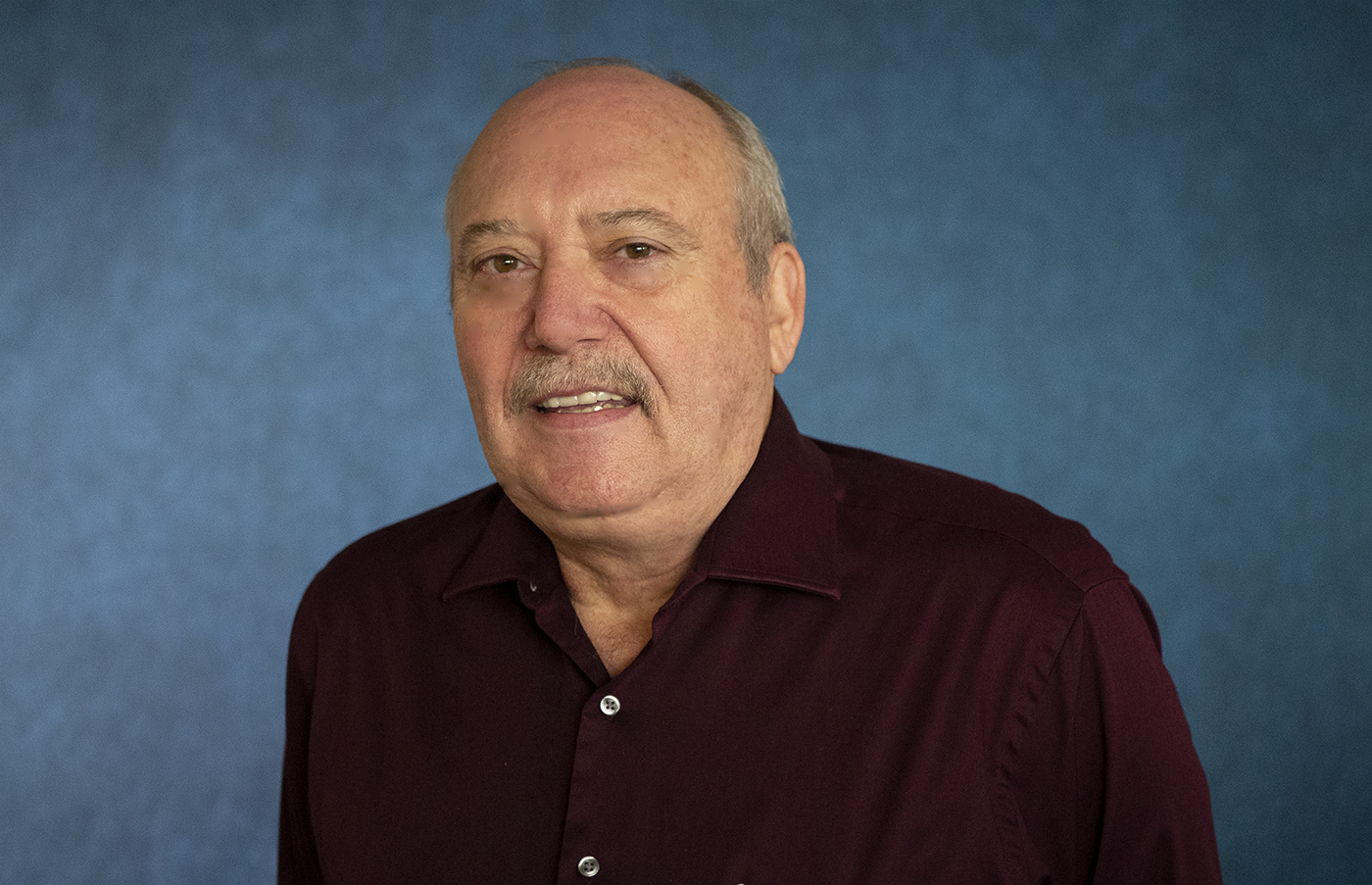
Danny Sorrells, Railroad Commission Assistant Executive Director & Oil and Gas Division DirectorTexas Drilling Permits and Completions Statistics for August 2018
September 11, 2018
AUSTIN –– The Railroad Commission of Texas (Commission) issued a total of 1,110 original drilling permits in August 2018 compared to 1,125 in August 2017. The August 2018 total included 967 permits to drill new oil or gas wells, 12 to re-enter plugged well bores and 131 for re-completions of existing well bores. The breakdown of well types for those permits is 262 oil, 83 gas, 689 oil or gas, 57 injection, five service and 14 other permits.
In August 2018, Commission staff processed 601 oil, 123 gas, 56 injection and three other completions compared to 401 oil, 115 gas, 38 injection and three other completions in August 2017. Total well completions processed for 2018 year to date are 7,297; up from 4,945 recorded during the same time period in 2017.
According to Baker Hughes Inc., the Texas rig count as of September 7 was 528, representing about 50 percent of all active rigs in the United States.
For additional drilling permit and completion statistics, visit the Commission’s monthly drilling and completion summaries web page.TABLE 1 – AUGUST 2018 TEXAS OIL AND GAS DRILLING PERMITS AND COMPLETIONS BY RAILROAD COMMISSION OF TEXAS DISTRICT*
DISTRICT
PERMITS TO DRILL OIL/GAS HOLES
OIL COMPLETIONS
GAS COMPLETIONS
(1) SAN ANTONIO AREA
154
62
25
(2) REFUGIO AREA
90
55
23
(3) SOUTHEAST TEXAS
59
18
6
(4) DEEP SOUTH TEXAS
28
2
8
(5) EAST CENTRAL TX
10
7
0
(6) EAST TEXAS
53
8
10
(7B) WEST CENTRAL TX
31
10
2
(7C) SAN ANGELO AREA
67
35
0
(8) MIDLAND
478
366
23
(8A) LUBBOCK AREA
58
5
0
(9) NORTH TEXAS
55
30
11
(10) PANHANDLE
27
3
15
TOTAL
1,110
601
123
*A district map is available on the Railroad Commission of Texas website
August
Commissioner Wayne Christian Addresses the Uintah Basin Energy Summit
August 31, 2018
AUSTIN – Railroad Commissioner Wayne Christian yesterday, spoke at the Uintah Basin Energy Summit in Vernal, UT on Texas’ regulatory leadership of the oil and gas industry and America’s path to energy security.
“Every state faces their own challenges when developing natural resources,” said Commissioner Christian. “It is important for states to communicate and work together to ensure the United States continues to expand energy production, and the jobs and economic growth that comes with it.”
The Uintah Basin Energy Summit is an important annual conference where local, national, and international energy companies, support services, and communities come together to discuss the national energy outlook and explore energy issues affecting the Uintah Basin.
“Many believe the United States will surpass Saudi Arabia and Russia as the largest producer of oil and natural gas in the world in the next five years,” continued Christian. “To ensure we reach this level of energy security, it is essential for states like Texas and Utah to maintain consistent and predictable regulatory climates that protect the public from bad actors without burdening industry with frivolous costs and requirements."
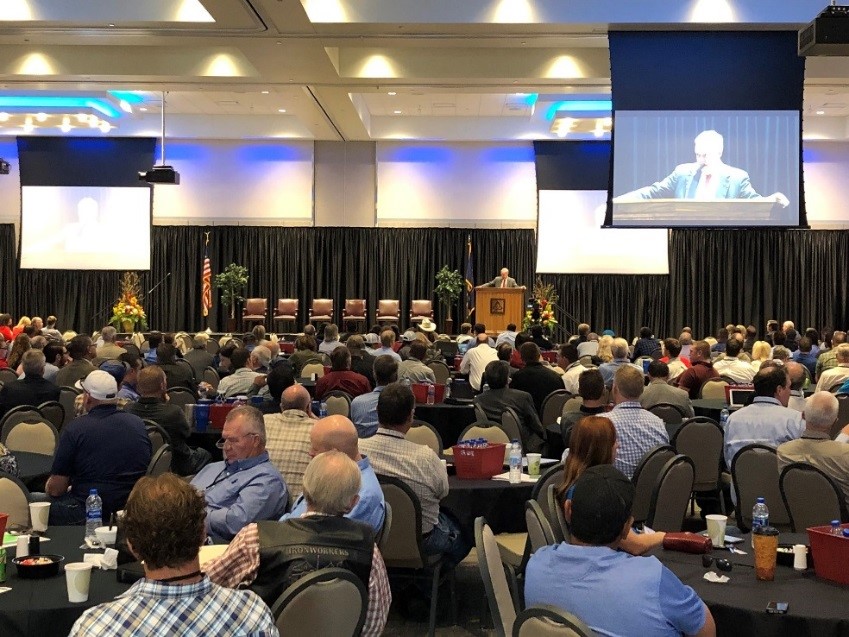
Comm. Christian Addresses 600 attendees at the Uintah Basin Energy Summit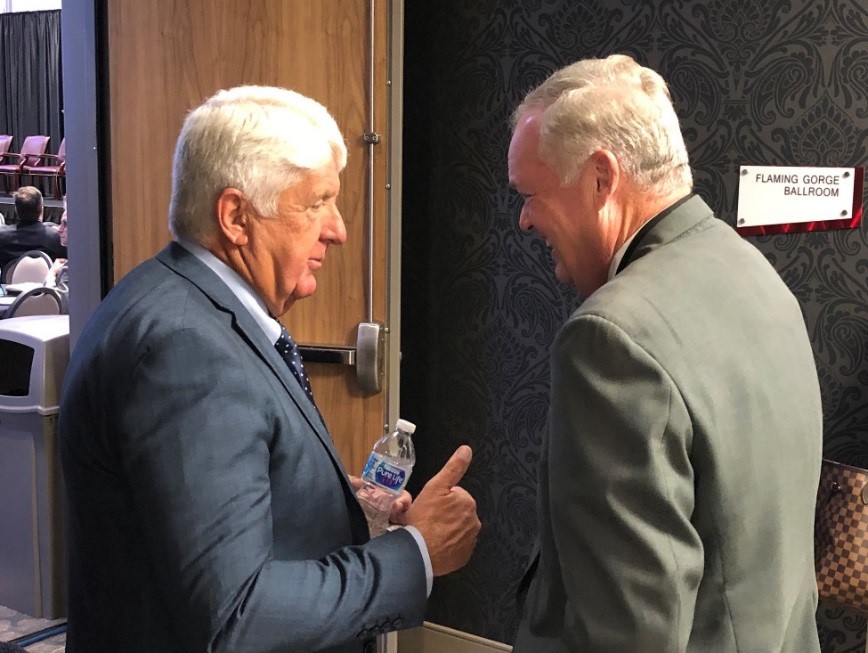
Comm. Christian visits with Congressman Rob Bishop (R-Utah), Chairman of Natural Resources Committee in Washington, D.C.
A lifelong conservative businessman, Wayne Christian was elected as our 50th Texas Railroad Commissioner in November 2016. Prior to his time at the Commission, Christian served seven Sessions in the Texas House of Representatives, accumulating a strong record of standing for free markets and against burdensome regulations. In addition to his duties as Commissioner, Christian was appointed by Governor Greg Abbott to serve as the Official Representative of Texas on the Interstate Oil and Gas Compact Commission. Christian is married to his wife, Lisa, and together they have three daughters, Liza, Lindsey and Lauren.Texas Oil and Gas Production Statistics for June 2018
August 30, 2018
AUSTIN –– Production for June 2018 as reported to the Railroad Commission of Texas (Commission) is 88,859,650 barrels of crude oil and 615,213,185 mcf (thousand cubic feet) of total gas from oil and gas wells. These preliminary figures are based on production volumes reported by operators and will be updated as late and corrected production reports are received. Production reported to the Commission for June 2017 was: 75,254,080 barrels of crude oil preliminarily, updated to a current figure of 90,091,648 barrels; and 591,408,525 mcf of total gas preliminarily, updated to a current figure of 661,542,424 mcf.
The Commission reports that from July 2017 to June 2018 total Texas reported production was 1.146 billion barrels of crude oil and 8.0 trillion cubic feet of total gas. Crude oil production reported by the Commission is limited to oil produced from oil leases and does not include condensate, which is reported separately by the Commission.
Texas preliminary June 2018 crude oil production averaged 2,961,988 barrels daily, compared to the 2,508,469 barrels daily average of June 2017.
Texas preliminary June 2018 total gas production averaged 20,507,106 mcf a day, compared to the 19,713,618 mcf daily average of June 2017.
Texas production in June 2018 came from 181,669 oil wells and 91,665 gas wells.
For additional oil and gas production statistics, visit the Commission’s Production Data web page.
TABLE 1 – JUNE 2018 TEXAS TOP TEN CRUDE OIL PRODUCING COUNTIES RANKED BY PRELIMINARY PRODUCTION
RANK
COUNTY
CRUDE OIL (BBLS)
1.
MIDLAND
9,874,765
2.
KARNES
6,841,805
3.
REEVES
5,238,957
4.
LOVING
5,182,434
5.
MARTIN
4,672,395
6.
UPTON
4,220,243
7.
DE WITT
4,030,079
8.
LA SALLE
4,023,445
9.
REAGAN
3,306,512
10.
ANDREWS
3,111,079
TABLE 2 – JUNE 2018 TEXAS TOP TEN TOTAL GAS (GAS WELL GAS & CASINGHEAD) PRODUCING COUNTIES RANKED BY PRELIMINARY PRODUCTIONRANK
COUNTY
TOTAL GAS (MCF)
1.
WEBB
58,036,674
2.
TARRANT
35,447,639
3.
REEVES
31,691,671
4.
MIDLAND
23,392,984
5.
KARNES
22,965,667
6.
LOVING
20,356,919
7.
PANOLA
19,911,133
8.
DE WITT
19,722,476
9.
REAGAN
17,296,872
10.
LA SALLE
16,182,683
TABLE 3 – JUNE 2018 TEXAS TOP TEN TOTAL CONDENSATE PRODUCING COUNTIES RANKED BY PRELIMINARY PRODUCTIONRANK
COUNTY
CONDENSATE (BBLS)
1.
REEVES
1,976,869
2.
CULBERSON
1,261,121
3.
DE WITT
1,226,708
4.
LOVING
1,134,744
5.
KARNES
1,005,241
6.
WEBB
810,699
7.
DIMMIT
389,349
8.
LIVE OAK
252,104
9.
LA SALLE
209,057
10.
WHEELER
166,170
Commissioner Wayne Christian Tours Houston Ship Channel
August 23, 2018
AUSTIN – Yesterday, Railroad Commissioner Wayne Christian toured the Houston Ship Channel with the Texas Waterways Operators Association to see first-hand how petroleum and petroleum-based products are exported from Texas.
Texas is the top producer and exporter of oil and natural gas in the United States. Total U.S. crude oil exports rose to a record high of 2 million barrels per day in May, making the U.S. Port District of Houston-Galveston accountable for 70% of crude exports in the United States.
“Marine transportation plays a pivotal role in Texas’ ability to export energy across the nation and globe,” said Commissioner Christian. “It is the work of Texas mariners and waterway operators that has allowed for our state to change worldwide energy dynamics in our favor.”
“Yesterday, the Energy Department announced that for the first time Texas exported more crude oil than it imported,” continued Christian. “This is huge news that demonstrates how close we are to energy security as a nation. This energy security is really national security, in that it allows us to be less energy reliant on potentially hostile nations overseas.”
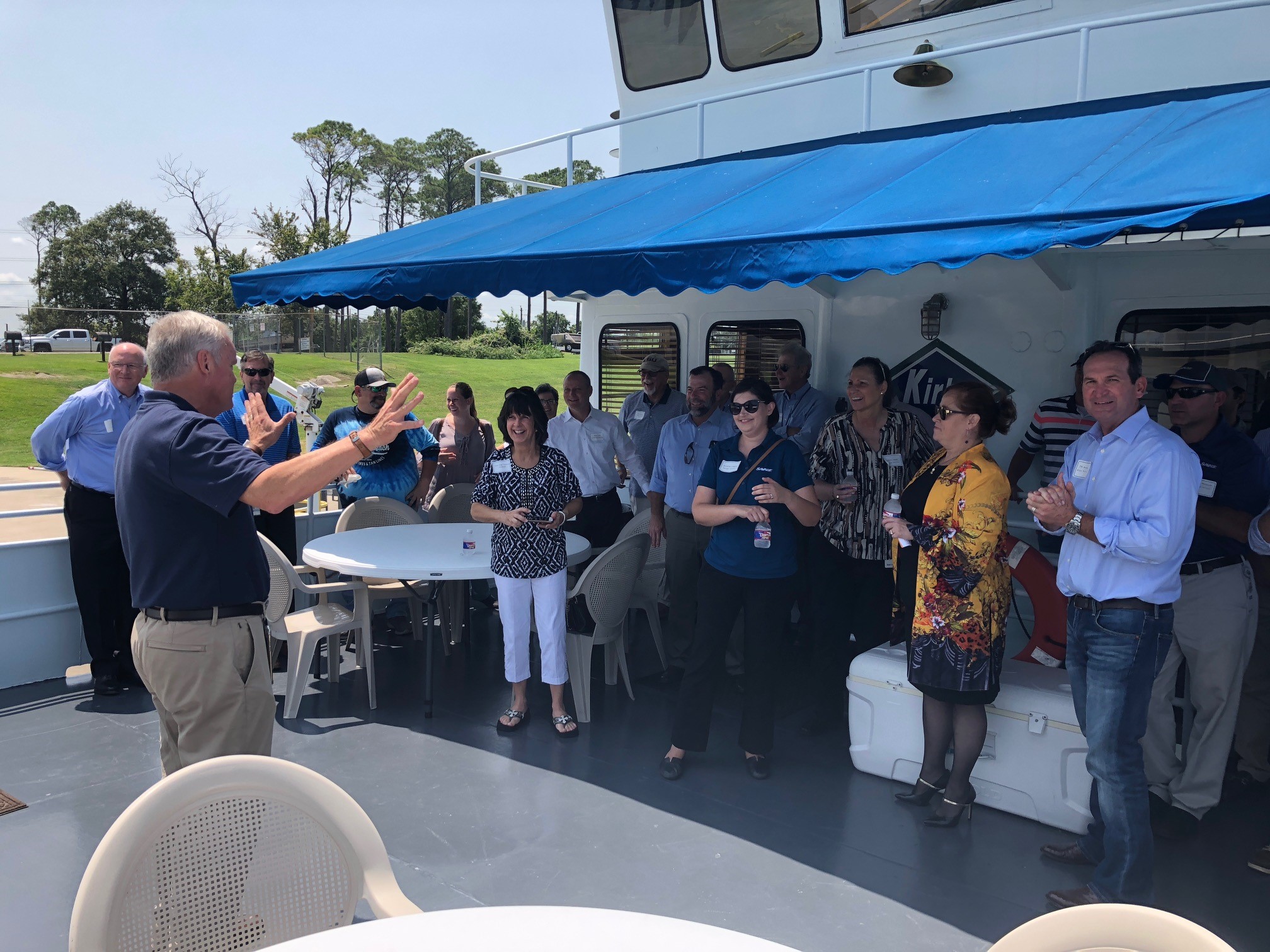

Comm. Christian with Rep. Valoree Swanson & Rep. Briscoe CainA lifelong conservative businessman, Wayne Christian was elected as our 50th Texas Railroad Commissioner in November 2016. Prior to his time at the Commission, Christian served seven Sessions in the Texas House of Representatives, accumulating a strong record of standing for free markets and against burdensome regulations. In addition to his duties as Commissioner, Christian was appointed by Governor Greg Abbott to serve as the Official Representative of Texas on the Interstate Oil and Gas Compact Commission. Christian is married to his wife, Lisa, and together they have three daughters, Liza, Lindsey and Lauren.
RRC Enforcement Actions Taken at Commissioners’ Aug. 21 Conference
August 23, 2018
AUSTIN – The Railroad Commission of Texas assessed $2,683,824 in fines involving 708 enforcement dockets against operators and businesses at the Commissioners’ conference this week. The Commission has primary oversight and enforcement of the state’s oil and gas industry and intrastate pipeline safety.
One operator was assessed $5,180 in an oil and gas docket that went to hearing. The final order for Docket 10-0309130 can be found on the RRC website here. One operator was assessed $2,500 in a damage prevention docket that went to hearing. The final order for Docket No. 51705 can be found here.
Operators were assessed $1,000,119 after failing to appear at Commission enforcement proceedings. Details on these Master Default Orders can be found on the RRC website here.
Operators were ordered to come into compliance with Commission rules and assessed $910,225 for oil and gas, LP-Gas and pipeline safety rule violations. Pipeline operators and excavators were assessed $765,800 for violations of the Commission’s Pipeline Damage Prevention rules. Details on all these Master Agreed Orders can be found on the RRC website here.
In the absence of timely motions for rehearing, decisions are final as stated in these final orders.
Railroad Commission Closes Out 1st Mining Permit Issued by the Agency
Commissioners Approve final reclamation work on Alcoa Mine Acreage August 21, 2018
AUSTIN – The Railroad Commission today closed out its first-ever surface mining permit issued in 1976. The permit, number 001 was issued to Alcoa USA Corp for the Sandow Mine. Commissioners unanimously approved the release of Alcoa USA Corp.’s surface mining bonds after the company met its final reclamation obligations on more than 4,800 acres at the Sandow Mine in Milam and Lee counties.
"Today’s release of the Sandow Mine permit is the culmination of decades of hard work and diligence by hundreds of people at the Railroad Commission to protect our environment while making sure we maximize the state’s natural resources,” said Denny Kingsley, RRC Surface Mining Director. “We release the site knowing it is in great shape for its next chapter in the story of Texas.”
RRC reclamation regulations ensure that mined land is returned to a condition that is as good as, or better than, it was before mining. Demonstrating the success of state environmental protection rules, the former mine is part of the Sandow Lakes Ranch.During the life of the permit, Commission staff conducted more than an estimated 1,000 inspections at the mine and processed almost 900 permitted actions for this permit.
Approximately 200 million tons of lignite have been produced from the Sandow Mine, since the Commission approved of the mine’s permit more than 40 years ago. At its most active period, the RRC’s Sandow mine permit encompassed almost 18,000 acres. Mining began at the Sandow Mine in the 1950s before mining regulations were in place with lignite coal used to generate electricity to power Alcoa’s aluminum smelter operations in Rockdale.
Texas Drilling Permits and Completions Statistics for July 2018
August 08, 2018
AUSTIN –– The Railroad Commission of Texas (Commission) issued a total of 1,153 original drilling permits in July 2018 compared to 1,011 in July 2017. The July 2018 total included 990 permits to drill new oil or gas wells, 23 to re-enter plugged well bores and 140 for re-completions of existing well bores. The breakdown of well types for those permits is 324 oil, 73 gas, 680 oil or gas, 67 injection, zero service and nine other permits.
In July 2018, Commission staff processed 753 oil, 157 gas, 29 injection and one other completions compared to 437 oil, 50 gas, 27 injection and two other completions in July 2017. Total well completions processed for 2018 year to date are 6,514; up from 4,388 recorded in for the same time period in 2017.
According to Baker Hughes Inc., the Texas rig count as of August 3 was 524, representing about 50 percent of all active rigs in the United States.
For additional drilling permit and completion statistics, visit the Commission’s monthly drilling completion summaries web page.TABLE 1 – JULY 2018 TEXAS OIL AND GAS DRILLING PERMITS AND COMPLETIONS BY RAILROAD COMMISSION OF TEXAS DISTRICT*
DISTRICT
PERMITS TO DRILL OIL/GAS HOLES
OIL COMPLETIONS
GAS COMPLETIONS
(1) SAN ANTONIO AREA
108
129
41
(2) REFUGIO AREA
106
113
17
(3) SOUTHEAST TEXAS
55
15
12
(4) DEEP SOUTH TEXAS
14
7
16
(5) EAST CENTRAL TX
6
1
4
(6) EAST TEXAS
30
5
31
(7B) WEST CENTRAL TX
32
10
0
(7C) SAN ANGELO AREA
87
50
0
(8) MIDLAND
577
369
20
(8A) LUBBOCK AREA
62
10
0
(9) NORTH TEXAS
54
40
9
(10) PANHANDLE
22
4
7
TOTAL
1,153
753
157
*A district map is available on the Railroad Commission of Texas here
July
Texas Oil and Gas Production Statistics for May 2018
July 25, 2018
AUSTIN –– Production for May 2018 as reported to the Railroad Commission of Texas (Commission) is 87,665,663 barrels of crude oil and 597,820,360 mcf (thousand cubic feet) of total gas from oil and gas wells. These preliminary figures are based on production volumes reported by operators and will be updated as late and corrected production reports are received. Production reported to the Commission for May 2017, was: 76,381,908 barrels of crude oil preliminarily, updated to a current figure of 92,567,068 barrels; and 560,452,280 mcf of total gas preliminarily, updated to a current figure of 677,750,728 mcf.
The Commission reports that from June 2017 to May 2018, total Texas reported production was 1.125 billion barrels of crude oil and 8.0 trillion cubic feet of total gas. Crude oil production reported by the Commission is limited to oil produced from oil leases and does not include condensate, which is reported separately by the Commission.
Texas preliminary May 2018 crude oil production averaged 2,827,925 barrels daily, compared to the 2,463,933 barrels daily average of May 2017.
Texas preliminary May 2018 total gas production averaged 19,284,528 mcf a day, compared to the 18,079,106 mcf daily average of May 2017.
Texas production in May 2018 came from 180,927 oil wells and 91,103 gas wells.
For additional oil and gas production statistics, visit the RRC’s Production Data web page.
TABLE 1 – MAY 2018 TEXAS TOP TEN CRUDE OIL PRODUCING COUNTIES RANKED BY PRELIMINARY PRODUCTIONRANK
COUNTY
CRUDE OIL (BBLS)
1.
MIDLAND
10,275,760
2.
KARNES
6,371,486
3.
LOVING
5,669,459
4.
REEVES
5,403,253
5.
MARTIN
4,779,710
6.
UPTON
4,531,861
7.
LA SALLE
4,004,614
8.
ANDREWS
3,201,839
9.
REAGAN
2,963,983
10.
GONZALES
2,637,919
TABLE 2 – MAY 2018 TEXAS TOP TEN TOTAL GAS (GAS WELL GAS & CASINGHEAD) PRODUCING COUNTIES RANKED BY PRELIMINARY PRODUCTIONRANK
COUNTY
TOTAL GAS (MCF)
1.
WEBB
39,550,118
2.
TARRANT
37,064,835
3.
REEVES
31,953,576
4.
MIDLAND
23,998,045
5.
LOVING
22,378,575
6.
KARNES
21,216,627
7.
PANOLA
20,186,767
8.
CULBERSON
16,619,873
9.
JOHNSON
16,543,518
10.
DE WITT
16,462,322
TABLE 3 – MAY 2018 TEXAS TOP TEN TOTAL CONDENSATE PRODUCING COUNTIES RANKED BY PRELIMINARY PRODUCTIONRANK
COUNTY
CONDENSATE (BBLS)
1.
REEVES
1,896,465
2.
CULBERSON
1,369,374
3.
LOVING
1,299,533
4.
DE WITT
1,046,932
5.
KARNES
880,315
6.
WEBB
702,667
7.
DIMMIT
358,518
8.
LIVE OAK
275,369
9.
LA SALLE
193,387
10.
WHEELER
179,677
Free the Market: No Taxpayer Subsidies, No Carbon Taxes
By Railroad Commissioner Wayne Christian July 24, 2018
Since being sworn-in as our 45th President of the United States, President Donald Trump has implemented an America-First energy strategy that has de-fanged an overreaching EPA, ended the Clean Power Plan, and removed us from the one-sided Paris Climate Accord, which threatened our national security, our nation’s energy security and the economic growth that comes along with it.
As a result, the United States has regained its rightful place as a global energy leader. For the first time since 1972, the nation produced more than 10 million barrels of oil per day, and many believe we will surpass Saudi Arabia and Russia as the world’s top energy producer in the next five years.
Regrettably, this progress is under attack. A Republican U.S. Congressman from Florida is attempting to undermine these hard-fought gains by proposing a carbon-tax on the American people. This carbon tax would increase the cost of gasoline for American families by more than 20 cents per gallon.
Much like former President Obama's Clean Power Plan, which would have increased the average Texan’s power and gas bills $1,060 annually, a carbon tax is a terrible idea because it harms American families and unfairly punishes one form of energy over others.Unfortunately, picking winners and losers in energy is nothing new in our country. For example, the American taxpayer has been on the hook for so-called green energy taxpayer subsidies for years. In fact, right now, a Texan would receive a $7,500 tax credit from the federal government and $2,500 rebate from our own state government to purchase an electric car.
This is money out your pocket and mine, going to help wealthy environmentalists buy an $82,000 Tesla. That’s roughly $23,000 more than the $59,000 the average family makes in a year in the United States. It’s no wonder Elon Musk is the largest recipient of taxpayer subsidies in our nation's history.
Boondoggles like Solyndra have highlighted the massive waste within the “green” energy movement. Yet we’ve done little to nothing to stop similar debacles from happening in the future. Inefficient, expensive, and unreliable sources of energy, like wind and solar, continue to receive taxpayer subsidies over significantly more efficient, affordable, and reliable sources, such as natural gas.
The inequality of these taxpayer subsidies is remarkable. Wind energy receives $56.24 in taxpayer subsidies per megawatt hour and solar receives $775.75. Natural gas receives 64 cents. This means wind is subsidized more than 878 times and solar more than 1,212 times than natural gas. Corporate investment follows these taxpayer subsidies, which is why companies keep adding more expensive wind and solar power to their “energy mix” – at the expense of hard-working Texas families.But wind and solar aren’t just expensive – they’re also highly inefficient and extremely unreliable. Wind and solar only produce energy intermittently – when the wind blows, and the sun is shines – and it takes 40,000 acres of windmills and 10,000 acres of solar panels to produce the same amount of energy as 12.5 acres of natural gas. This has been done by our knows-what’s-best-for-us politicians in Washington D.C. despite the tremendous amount of data that shows how enormously inefficient and unreliable these forms of energy are compared to oil and natural gas.
Implementing a carbon-tax on American families is a feel-good solution in search of a problem. The United States lowered its carbon emissions more than any other country in the world last year. That’s the ninth time that’s happened in the last eighteen years. This reduction is a direct result of technological advancement, such as fracking and horizontal drilling, and the increased use of natural gas. Punitive policies, such as carbon-taxes, do little to decrease carbon emissions, while increasing the cost-of-living for American families. It’s all risk and no reward.
###
A lifelong conservative businessman, Wayne Christian was elected as our 50th Texas Railroad Commissioner in November 2016. Prior to his time at the Commission, Christian served seven Sessions in the Texas House of Representatives, accumulating a strong record of standing for free markets and against burdensome regulations. In addition to his duties as Commissioner, Christian was appointed by Governor Greg Abbott to serve as the Official Representative of Texas on the Interstate Oil and Gas Compact Commission. Christian is married to his wife, Lisa, and together they have three daughters, Liza, Lindsey and Lauren.
RRC Wraps Up Abandoned Mine Restoration Project
54-year-old abandoned uranium mine restored to natural landscape July 17, 2018
AUSTIN – The Railroad Commission’s Abandoned Mine Land program has completed restoration of an eight-acre abandoned uranium mine in Karnes County. Known as the Hackney Site, it was last mined in 1963 and sat abandoned for 54 years. It was selected for remediation because of the safety hazard abandoned pits pose to the public, as well as elevated naturally-occurring radiation levels. The four-month long project reduced radiation to safe levels and restored the area to its natural state.
“Abandoned mine sites like this can present many hazards to landowners, the public, livestock, wildlife and the natural environment, so it’s critical we restore them to a safe, usable condition,” said Cory Gretlein, P.E., AML engineer. “Sites like this have near vertical pit walls, often adjacent to deep water bodies that pose a drowning hazard. While the radiation in these sites is naturally occurring, we want to make certain it is at a safe level for people, animals and the environment.”
During the Hackney Site project, which was managed by the RRC, 60,000 cubic yards of naturally occurring radioactive soil was properly disposed of through on-site burial in the abandoned pit. Once filled, the material was capped with topsoil and storm water control features were installed. New, native vegetation was also planted on the site to restore it to its natural state.
The project was funded by a $664,349 federal grant from the federal Office of Surface Mining Reclamation and Enforcement. AML staff will monitor the site to ensure healthy growth of vegetation and to maintain erosion control.
For a time-lapse video of the project showing progress of the project, please click here.
You can find more information on the RRC’s Abandoned Mine Land program on our website
Before and after photos are included in this press release.
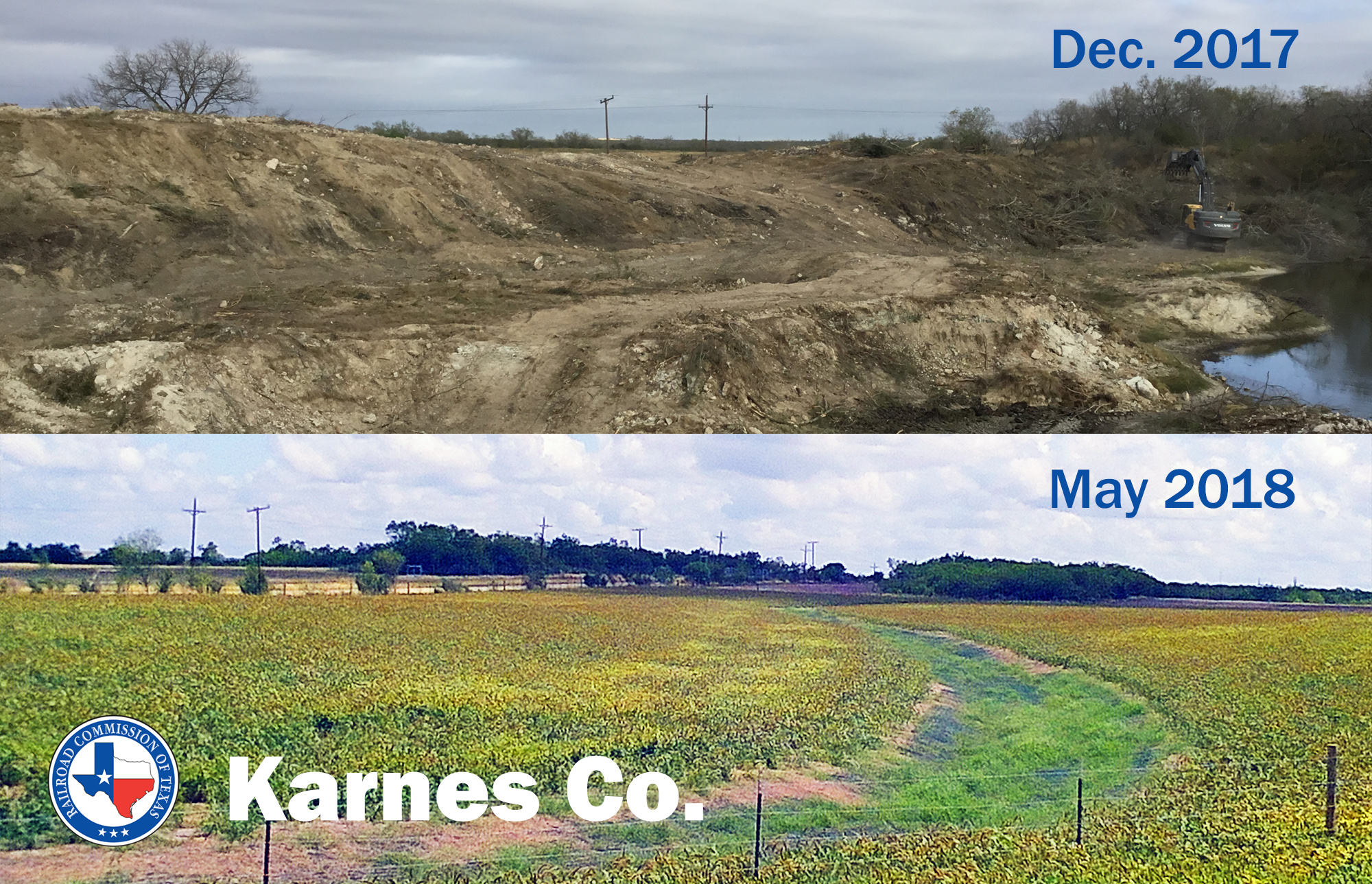
Chairman Craddick Convenes Energy Industry to Address Human Trafficking
July 10, 2018
AUSTIN – Railroad Commission Chairman Christi Craddick yesterday joined Governor Greg Abbott’s Child Sex Trafficking Team (CSTT) and energy industry representatives to raise awareness about human trafficking and how the energy industry can work to prevent and address the issue in Texas. The meeting was hosted by the Texas Oil and Gas Association in Austin.
“The exploitation of Texans who are forced to work in abusive circumstances is intolerable,” Craddick said. “I applaud the Governor’s efforts to educate industry and the public on human trafficking and establish preventative networks and resources to better protect our citizens. I am committed to assisting the Governor in working with industry members to coordinate the distribution of information and resources for this purpose.”
The CSTT was established within the Office of the Governor in 2015 and works to prevent victimization, identify and recover survivors, provide coordinated services to help them heal and thrive, and bring those involved in these heinous crimes to justice. Learn more about these strategies by visiting https://gov.texas.gov.
For more information on human trafficking occurring in Texas and training resources available to the public, please visit the attorney general’s website at https://texasattorneygeneral.gov/human-trafficking.
If you suspect human trafficking, report it to the National Human Trafficking Hotline: 1-888-373-7888. If the situation is an emergency, call 911.
Christi Craddick was elected statewide by the people of Texas in November 2012 to serve a six-year term as Texas Railroad Commissioner. A native of Midland, Christi is an attorney specializing in oil and gas, water, tax issues, electric deregulation and environmental policy.
Texas Drilling Permits and Completions Statistics for June 2018
July 10, 2018
AUSTIN – The Railroad Commission of Texas (Commission) issued a total of 1,230 original drilling permits in June 2018 compared to 1,305 in June 2017. The June total included 1,062 permits to drill new oil or gas wells, 13 to re-enter plugged well bores and 155 for re-completions of existing well bores. The breakdown of well types for those permits issued June 2018 included 342 oil, 67 gas, 742 oil or gas, 55 injection, five service and 19 other permits.
In June 2018, Commission staff processed 914 oil, 158 gas, 48 injection and four other completions compared to 510 oil, 96 gas, 43 injection and zero other completions in June 2017. Total well completions processed for 2018 year to date are 5,574; up from 3,872 recorded in 2017.
According to Baker Hughes Inc., the Texas rig count as of July 6 was 526, representing about 50 percent of all active rigs in the United States.
For additional drilling permit and completion statistics, visit the Commission’s monthly drilling completion summaries web page.TABLE 1 – JUNE 2018 TEXAS OIL AND GAS DRILLING PERMITS AND COMPLETIONS BY RAILROAD COMMISSION OF TEXAS DISTRICT*
DISTRICT
PERMITS TO DRILL OIL/GAS HOLES
OIL COMPLETIONS
GAS COMPLETIONS
(1) SAN ANTONIO AREA
147
163
55
(2) REFUGIO AREA
104
96
22
(3) SOUTHEAST TEXAS
68
24
6
(4) DEEP SOUTH TEXAS
13
3
8
(5) EAST CENTRAL TX
8
4
0
(6) EAST TEXAS
35
5
15
(7B) WEST CENTRAL TX
31
36
1
(7C) SAN ANGELO AREA
119
78
0
(8) MIDLAND
561
425
31
(8A) LUBBOCK AREA
67
18
0
(9) NORTH TEXAS
33
40
8
(10) PANHANDLE
44
22
12
TOTAL
1,230
914
158
*A district map is available on the Railroad Commission of Texas here
June
Texas Oil and Gas Production Statistics for April 2018
June 29, 2018
AUSTIN – Production for April 2018 as reported to the Railroad Commission of Texas (Commission) is 83,157,720 barrels of crude oil and 548,754,930 mcf (thousand cubic feet) of total gas from oil and gas wells. These preliminary figures are based on production volumes reported by operators and will be updated as late and corrected production reports are received. Production reported to the Commission for April 2017, was: 78,389,597 barrels of crude oil preliminarily, updated to a current figure of 87,219,115 barrels; and 605,379,703 mcf of total gas preliminarily, updated to a current figure of 648,561,000 mcf.
The Commission reports that from May 2017 to April 2018, total Texas reported production was 1.104 billion barrels of crude oil and 7.873 billion cubic feet of total gas. Crude oil production reported by the Commission is limited to oil produced from oil leases and does not include condensate, which is reported separately by the Commission.
Texas preliminary April 2018 crude oil production averaged 2,771,924 barrels daily, compared to the 2,612,987 barrels daily average of April 2017.
Texas preliminary April 2018 total gas production averaged 18,291,831 mcf a day, compared to the 20,179,323 mcf daily average of April 2017.
Texas production in April 2018 came from 180,834 oil wells and 91,197 gas wells.
For additional oil and gas production statistics, including the ranking of each Texas County by crude oil, total gas and condensate production, visit the RRC’s website.TABLE 1 – APRIL 2018 TEXAS TOP TEN CRUDE OIL PRODUCING COUNTIES RANKED BY PRELIMINARY PRODUCTION
RANK
COUNTY
CRUDE OIL (BBLS)
1.
MIDLAND
9,270,982
2.
KARNES
6,029,673
3.
LOVING
5,508,413
4.
REEVES
5,254,439
5.
MARTIN
4,495,527
6.
UPTON
4,259,404
7.
LA SALLE
3,657,944
8.
ANDREWS
3,156,312
9.
HOWARD
2,878,078
10.
DE WITT
2,636,021
TABLE 2 – APRIL 2018 TEXAS TOP TEN TOTAL GAS (GAS WELL GAS & CASINGHEAD) PRODUCING COUNTIES RANKED BY PRELIMINARY PRODUCTIONRANK
COUNTY
TOTAL GAS (MCF)
1.
WEBB
35,923,328
2.
TARRANT
33,063,574
3.
REEVES
30,321,071
4.
LOVING
21,828,271
5.
MIDLAND
21,394,974
6.
KARNES
18,503,262
7.
CULBERSON
16,618,390
8.
JOHNSON
15,910,674
9.
DE WITT
15,864,759
10.
PANOLA
15,742,994
TABLE 3 – APRIL 2018 TEXAS TOP TEN TOTAL CONDENSATE PRODUCING COUNTIES RANKED BY PRELIMINARY PRODUCTION
RANK
COUNTY
CONDENSATE (BBLS)
1.
REEVES
1,675,455
2.
CULBERSON
1,367,509
3.
LOVING
1,335,264
4.
DE WITT
1,010,503
5.
KARNES
789,372
6.
WEBB
629,858
7.
DIMMIT
315,447
8.
LIVE OAK
266,209
9.
WHEELER
192,683
10.
LA SALLE
184,944
RRC Chairman Craddick and PUC Chairman Walker Working to Ensure Availability of Natural Gas for Reliable Electric Service this Summer
June 26, 2018
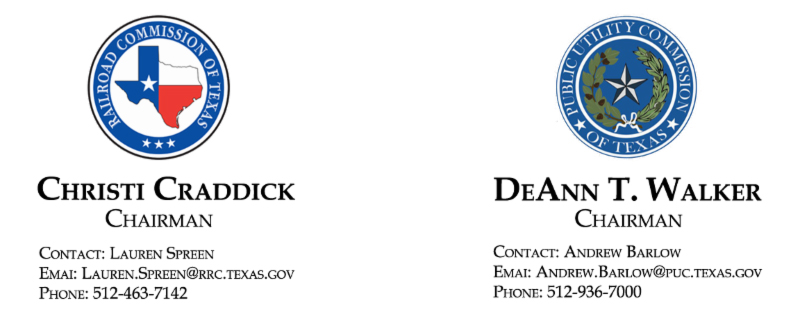
AUSTIN – June 26, 2018
Railroad Commission Chairman Christi Craddick and Public Utility Commission Chairman DeAnn Walker are urging natural gas pipeline operators and electric generation plant operators to work together to ensure availability of pipeline transmission capacity to meet electric generation needs at times of peak demand during the hot Texas summer. Craddick and Walker are asking stakeholders to work with the Railroad Commission’s Oversight and Safety Division to schedule required pipeline testing outside of peak demand months. During the required tests, pipelines are unable to deliver natural gas, which fuels electric generation plants across Texas.
“Pipeline safety is one of the most important areas we regulate at the Railroad Commission,” Chairman Craddick said.
“Integrity testing of gas transmission pipelines is a critical part of our safety requirements and should be scheduled to maximize operational availability. We must all work together to make sure the citizens of Texas are able to keep their air conditioning running, fans blowing, and lights on during the hot Texas summer.”
“Gas fired electric generation plants make up nearly 40% of our ERCOT’s electric generation, so we need to be sure they are online during times of peak demand,” said Chairman Walker. “With our state’s robust economy and growing population, demand is higher than ever. Therefore, teamwork is the key to a successful summer for all Texans.”
The Railroad Commission and Public Utility Commission have issued the attached notice to natural gas pipeline operators and electric generation plant operators.
Railroad Commission and Public Utility Commission staff are monitoring electric generation needs during peak demand months and assisting with necessary coordination of pipeline transmission capacity to best ensure natural gas availability for electric generation facilities.
RRC Enforcement Actions Taken at Commissioners’ June 19 Conference
June 21, 2018
AUSTIN – The Railroad Commission of Texas assessed $220,373 in fines involving 132 enforcement dockets against operators and businesses at the Commissioners’ conference this week. The Commission has primary oversight and enforcement of the state’s oil and gas industry and intrastate pipeline safety.
One operator was assessed $22,310 in an oil and gas docket that went to hearing. The final order for 7B-0307112 can be found on the RRC website here.
Operators were ordered to come into compliance with Commission rules and assessed $21,188 for oil and gas, LP-Gas and pipeline safety rule violations. Pipeline operators and excavators were assessed $176,875 for violations of the Commission’s Pipeline Damage Prevention rules. Details on all these Master Agreed Orders can be found on the RRC website here.
In the absence of timely motions for rehearing, decisions are final as stated in these final orders.
Commissioner Ryan Sitton Partners with Radio Show to Produce ‘The Energy Minute’
June 13, 2018
AUSTIN — Texas Railroad Commissioner Ryan Sitton recently partnered with “In the Oil Patch,” a radio show produced by Shale Magazine, to produce daily one-minute energy updates with everything Texans need to know about energy prices, current events impacting markets and more. The segment, “The Energy Minute,” is part of a new expansion for “In the Oil Patch” and brings the show to nine signals and five radio stations throughout the state, reaching millions of listeners each week.
“We have in Texas an opportunity to become the most powerful energy economy in the world, which is why it’s critical that Texans are up-to-date on energy news, regulations and trends impacting them,” Sitton said.
“This radio segment is an effective, educational way to reach millions of Texans, giving them the information they need to feel confident about producing a massive part of the world’s energy right in our backyard.”
To hear “The Energy Minute,” Texans can tune in on KSIX in Corpus Christi, KWEL in Midland, Freedom 1160 in San Antonio, KRTH in Houston, and KFXR in Dallas.
“Oil and gas in Texas are significant sources of economical development and high paying jobs for our great state,” Kym Bolado, publisher and CEO of Shale Magazine, said. “Informing and educating the community on energy topics is our mission, and we are fortunate to have the assistance of the Railroad Commission of Texas and Railroad Commissioner Ryan Sitton to help us achieve this goal.”
Ryan Sitton was elected to the Railroad Commission in 2014 and is the first engineer to serve on the Commission in 50 years. Sitton is one of the world’s leading energy experts and founded PinnacleART, an engineering and technology company focused on reliability and integrity programs for the oil, gas, and petrochemical, mining, pharmaceutical, and wastewater industries. As Railroad Commissioner, Sitton uses his technical expertise and business experience to make decisions for the state that are based on sound science and employs a fiscally conservative approach to prioritize the agency’s efforts.
Texas Drilling Permits and Completions Statistics for May 2018
June 08, 2018
AUSTIN –– The Railroad Commission of Texas (Commission) issued a total of 1,243 original drilling permits in May 2018 compared to 1,021 in May 2017. The May total included 1,118 permits to drill new oil or gas wells, 13 to re-enter plugged well bores and 112 for re-completions of existing well bores. The breakdown of well types for those permits issued May 2018 included 278 oil, 77 gas, 801 oil or gas, 72 injection, zero service and 15 other permits.
In May 2018, Commission staff processed 739 oil, 134 gas, 57 injection and six other completions compared to 593 oil, 115 gas, 60 injection and zero other completions in May 2017. Total well completions processed for 2018 year to date are 4,450; up from 3,223 recorded in 2017.
According to Baker Hughes Inc., the Texas rig count as of June 8 was 538, representing about 51 percent of all active rigs in the United States.
For additional drilling permit and completion statistics, visit the Commission’s monthly drilling completion summaries web page.
TABLE 1 – MAY 2018 TEXAS OIL AND GAS DRILLING PERMITS AND COMPLETIONS BY RAILROAD COMMISSION OF TEXAS DISTRICT*
DISTRICT
PERMITS TO DRILL OIL/GAS HOLES
OIL COMPLETIONS
GAS COMPLETIONS
(1) SAN ANTONIO AREA
126
149
51
(2) REFUGIO AREA
134
31
7
(3) SOUTHEAST TEXAS
59
22
10
(4) DEEP SOUTH TEXAS
25
2
5
(5) EAST CENTRAL TX
9
10
0
(6) EAST TEXAS
31
15
10
(7B) WEST CENTRAL TX
42
11
3
(7C) SAN ANGELO AREA
87
49
0
(8) MIDLAND
597
404
20
(8A) LUBBOCK AREA
76
16
0
(9) NORTH TEXAS
40
26
22
(10) PANHANDLE
17
4
6
TOTAL
1,243
739
134
*A district map is available on the Railroad Commission of Texas here
RRC Enforcement Actions Taken at Commissioners’ June 5 Conference
June 07, 2018
AUSTIN – The Railroad Commission of Texas assessed $349,172 in fines involving 97 enforcement dockets against operators and businesses at the Commissioners’ conference this week. The Commission has primary oversight and enforcement of the state’s oil and gas industry and intrastate pipeline safety.
Operators were assessed $142,511 after failing to appear at Commission enforcement proceedings. Details on these Master Default Orders can be found on the RRC website here
Operators were ordered to come into compliance with Commission rules and assessed $89,911 for oil and gas, LP-Gas and pipeline safety rule violations. Pipeline operators and excavators were assessed $116,750 for violations of the Commission’s Pipeline Damage Prevention rules. Details on all these Master Agreed Orders can be found on the RRC website here
In the absence of timely motions for rehearing, decisions are final as stated in these final orders.
May
Texas Oil and Gas Production Statistics for March 2018
May 29, 2018
AUSTIN –– Production for March 2018 as reported to the Railroad Commission of Texas (Commission) is 86,436,682 barrels of crude oil and 577,823,501 mcf (thousand cubic feet) of total gas from oil and gas wells. These preliminary figures are based on production volumes reported by operators and will be updated as late and corrected production reports are received. Production reported to the Commission for March 2017, was: 77,262,815 barrels of crude oil preliminarily, updated to a current figure of 90,033,198 barrels; and 608,006,175 mcf of total gas preliminarily, updated to a current figure of 663,678,736 mcf.
The Commission reports that from April 2017 to March 2018, total Texas reported production was 1.081 billion barrels of crude oil and 7.8 trillion cubic feet of total gas. Crude oil production reported by the Commission is limited to oil produced from oil leases and does not include condensate, which is reported separately by the Commission.
Texas preliminary March 2018 crude oil production averaged 2,788,280 barrels daily, compared to the 2,492,349 barrels daily average of March 2017.
Texas preliminary March 2018 total gas production averaged 18,639,468 mcf a day, compared to the 19,613,102 mcf daily average of March 2017.
Texas production in March 2018 came from 180,368 oil wells and 91,195 gas wells.
TABLE 1 – MARCH 2018 TEXAS TOP TEN CRUDE OIL PRODUCING COUNTIES RANKED BY PRELIMINARY PRODUCTION
RANK
COUNTY
CRUDE OIL (BBLS)
1.
MIDLAND
8,945,928
2.
KARNES
6,646,700
3.
REEVES
5,775,483
4.
LOVING
5,460,229
5.
UPTON
4,606,227
6.
MARTIN
4,492,212
7.
LA SALLE
3,865,682
8.
ANDREWS
3,389,652
9.
HOWARD
3,111,601
10.
REAGAN
3,056,518
TABLE 2 – MARCH 2018 TEXAS TOP TEN TOTAL GAS (GAS WELL GAS & CASINGHEAD) PRODUCING COUNTIES RANKED BY PRELIMINARY PRODUCTIONRANK
COUNTY
TOTAL GAS (MCF)
1.
WEBB
39,231,981
2.
TARRANT
34,126,440
3.
REEVES
30,740,106
4.
LOVING
21,942,538
5.
MIDLAND
21,495,385
6.
KARNES
20,453,348
7.
PANOLA
17,904,444
8.
JOHNSON
16,650,411
9.
CULBERSON
16,589,549
10.
DE WITT
16,220,934
TABLE 3 – MARCH 2018 TEXAS TOP TEN TOTAL CONDENSATE PRODUCING COUNTIES RANKED BY PRELIMINARY PRODUCTION
RANK
COUNTY
CONDENSATE (BBLS)
1.
REEVES
1,631,928
2.
CULBERSON
1,316,368
3.
LOVING
1,310,064
4.
DE WITT
1,076,681
5.
KARNES
868,049
6.
WEBB
822,065
7.
DIMMIT
412,949
8.
LIVE OAK
288,882
9.
LA SALLE
201,036
10.
WHEELER
178,888
RRC Enforcement Actions Taken at Commissioners’ May 22 Conference
May 24, 2018
AUSTIN – The Railroad Commission of Texas assessed $698,679 in fines involving 232 enforcement dockets against operators and businesses at the Commissioners’ conference this week. The Commission has primary oversight and enforcement of the state’s oil and gas industry and intrastate pipeline safety.
Operators were assessed $334,090 after failing to appear at Commission enforcement proceedings. Details on these Master Default Orders can be found on the RRC website here
Operators were ordered to come into compliance with Commission rules and assessed $102,039 for oil and gas, LP-Gas and pipeline safety rule violations. Pipeline operators and excavators were assessed $262,550 for violations of the Commission’s Pipeline Damage Prevention rules. Details on all these Master Agreed Orders can be found on the RRC website here.
In the absence of timely motions for rehearing, decisions are final as stated in these final orders.
Texas Drilling Permits and Completions Statistics for April 2018
May 10, 2018
AUSTIN –– The Railroad Commission of Texas (Commission) issued a total of 1,221 original drilling permits in April 2018 compared to 909 in April 2017. The April total included 1,101 permits to drill new oil or gas wells, seven to re-enter plugged well bores and 113 for re-completions of existing well bores. The breakdown of well types for those permits issued April 2018 included 331 oil, 60 gas, 731 oil or gas, 87 injection, one service and 11 other permits.
In April 2018, Commission staff processed 616 oil, 134 gas, 48 injection and four other completions compared to 439 oil, 44 gas, 45 injection and two other completions in April 2017. Total well completions processed for 2018 year to date are 3,514; up from 2,455 recorded in 2017.
According to Baker Hughes Inc., the Texas rig count as of May 4 was 515, representing about 50 percent of all active rigs in the United States.
For additional drilling permit and completion statistics, visit the Commission’s monthly drilling completion summaries web page.TABLE 1 – APRIL 2018 TEXAS OIL AND GAS DRILLING PERMITS AND COMPLETIONS BY RAILROAD COMMISSION OF TEXAS DISTRICT*
DISTRICT
PERMITS TO DRILL OIL/GAS HOLES
OIL COMPLETIONS
GAS COMPLETIONS
(1) SAN ANTONIO AREA
147
70
16
(2) REFUGIO AREA
105
42
21
(3) SOUTHEAST TEXAS
48
13
9
(4) DEEP SOUTH TEXAS
21
0
7
(5) EAST CENTRAL TX
1
3
2
(6) EAST TEXAS
46
10
11
(7B) WEST CENTRAL TX
36
10
0
(7C) SAN ANGELO AREA
97
30
0
(8) MIDLAND
573
345
46
(8A) LUBBOCK AREA
71
71
0
(9) NORTH TEXAS
51
20
9
(10) PANHANDLE
25
2
13
TOTAL
1,221
616
134
* A district map is available on the Railroad Commission of Texas here
Interstate Oil and Gas Compact Commission Passes Christian Resolution
Compact Will Encourage Federal Government to Look into Delegation of Authority May 09, 2018
AUSTIN – Yesterday, the Interstate Oil and Gas Compact Commission (IOGCC) passed Commissioner Wayne Christian’s (R – Texas) resolution asking President Donald Trump and Congress, in the spirit of Cooperative Federalism, to identify federal regulations that should be delegated to the states.
You can read the resolution here.
“We are facing a unique time in the history of our nation, especially regarding energy,” said Christian.
“The United States is on track to surpass Saudi Arabia and Russia as the top producer of oil and gas in the world. This is an excellent opportunity for states to join together to work with the federal government to transcend partisan politics and correct misuses of federal regulatory power that have threatened our energy sector, the jobs it creates and the economy of our states.”
According to the action plan, IOGCC will send copies of the resolution to the President, Vice President, key administration officials, and Congressional leaders to encourage them to identify federal regulations that should be delegated to the states to improve regulatory efficiency and effectiveness.
The IOGCC is a multi-state government agency that works to ensure our nation's oil and natural gas resources are conserved and maximized while protecting health, safety and the environment. IOGCC was created more than 80 years ago when six states joined together to resolve common issues and share best practices for industry regulation, minimizing federal intervention. Commissioner Wayne Christian was appointed by Gov. Greg Abbott as Texas’ official representative to IOGCC in April 2017.
A lifelong conservative businessman, Wayne Christian was elected to join the Railroad Commission of Texas in November 2016. In 1996, Christian was elected to the House of Representatives. During this time, Christian served as Vice-Chair of Regulated Industries and as a multi-term member of the Energy Resource Committee. On these committees, he had direct oversight of the Railroad Commission and accumulated a strong record of standing for free markets and against burdensome regulations.
April
Commissioner Christian Hosts Third Summit on Education and Workforce Development
April 27, 2018
AUSTIN–Commissioner Wayne Christian (R – Texas) recently hosted the third summit for his Energy Education and Workforce Development Initiative. Prior to the meeting, Commissioner Christian testified before the House Energy Resources Committee on related issues.
You can view Commissioner Christian’s testimony before the House Energy Resource Committee here.
You can view highlights of Commissioner Christian’s third energy summit here.
“Texas is the epicenter of what I believe will be the largest oil boom in the history of our country,” said Commissioner Christian.
“As I travel the state and visit with folks across the sectors of the energy industry, I hear almost universally that the biggest hinderance to this boom is a lack of labor. It is important for Texas to be a leader on this crucial issue to ensure the next generation understand the opportunities for high-paying jobs available to them in oil and gas.”
At the summit, participants reviewed a sub-committee report looking into the creation of a new college curriculum that meet the needs of our oil and gas industry and fit in line with existing graduation requirements. That report can be seen here.
Additionally, Representative Jason Isaac (R – Dripping Springs) discussed K-12 curriculum and delivered a compilation of resources put together by the sub-committee on K-12 Resources. You can view that list here.
Other issues discussed were our state’s shortage of commercial truck drivers who are critical to the transportation of our energy resources, and how to help educate the general public on the importance of energy in the State of Texas.
A lifelong conservative businessman, Wayne Christian was elected to join the Railroad Commission of Texas in November 2016. In 1996, Christian was elected to the House of Representatives. During this time, Christian served as Vice-Chair of Regulated Industries and as a multi-term member of the Energy Resource Committee. On these committees, he had direct oversight of the Railroad Commission and accumulated a strong record of standing for free markets and against burdensome regulations.
RRC Enforcement Actions Taken at Commissioners’ April 24 Conference
April 27, 2018
AUSTIN – The Railroad Commission of Texas assessed $436,729 in fines involving 108 enforcement dockets against operators and businesses at the Commissioners’ conference this week. The Commission has primary oversight and enforcement of the state’s oil and gas industry and intrastate pipeline safety.
One operator was assessed $4,800 in an oil and gas docket that went to hearing. The final order for 6E-0304617 can be found on the RRC website here.
Operators were assessed $237,539 after failing to appear at Commission enforcement proceedings. Details on these Master Default Orders can be found on the RRC website here
Operators were ordered to come into compliance with Commission rules and assessed $58,015 for oil and gas, LP-Gas and pipeline safety rule violations. Pipeline operators and excavators were assessed $136,375 for violations of the Commission’s Pipeline Damage Prevention rules. Details on all these Master Agreed Orders can be found on the RRC website here.
In the absence of timely motions for rehearing, decisions are final as stated in these final orders.
Texas Oil and Gas Production Statistics for February 2018
April 27, 2018
AUSTIN – Production for February 2018 as reported to the Railroad Commission of Texas (Commission) is 76,545,962 barrels of crude oil and 529,417,231 mcf (thousand cubic feet) of total gas from oil and gas wells. These preliminary figures are based on production volumes reported by operators and will be updated as late and corrected production reports are received. Production reported to the Commission for February 2017, was: 70,332,051 barrels of crude oil preliminarily, updated to a current figure of 81,385,503 barrels; and 527,710,713 mcf of total gas preliminarily, updated to a current figure of 602,124,139 mcf.
The Commission reports that from March 2017 to February 2018, total Texas reported production was 1.063 billion barrels of crude oil and 7.7 trillion cubic feet of total gas. Crude oil production reported by the Commission is limited to oil produced from oil leases and does not include condensate, which is reported separately by the Commission.
Texas preliminary February 2018 crude oil production averaged 2,733,784 barrels daily, compared to the 2,511,859 barrels daily average of February 2017.
Texas preliminary February 2018 total gas production averaged 18,907,758 mcf a day, compared to the 18,846,811 mcf daily average of February 2017.
Texas production in February 2018 came from 179,902 oil wells and 91,966 gas wells.
For additional oil and gas production statistics, including the ranking of each Texas County by crude oil, total gas and condensate production, visit the RRC’s website.
TABLE 1 – FEBRUARY 2018 TEXAS TOP TEN CRUDE OIL PRODUCING COUNTIES RANKED BY PRELIMINARY PRODUCTIONRANK
COUNTY
CRUDE OIL (BBLS)
1.
MIDLAND
7,649,986
2.
KARNES
5,568,782
3.
REEVES
4,803,637
4.
LOVING
4,609,573
5.
UPTON
4,280,838
6.
MARTIN
4,141,503
7.
LA SALLE
3,374,791
8.
ANDREWS
2,977,708
9.
REAGAN
2,926,075
10.
HOWARD
2,692,454
TABLE 2 – FEBRUARY 2018 TEXAS TOP TEN TOTAL GAS (GAS WELL GAS & CASINGHEAD) PRODUCING COUNTIES RANKED BY PRELIMINARY PRODUCTIONRANK
COUNTY
TOTAL GAS (MCF)
1.
WEBB
52,830,234
2.
TARRANT
31,246,869
3.
REEVES
24,292,917
4.
MIDLAND
19,008,575
5.
LOVING
17,663,344
6.
KARNES
17,509,497
7.
PANOLA
15,933,943
8.
JOHNSON
15,135,195
9.
DE WITT
14,832,110
10.
LA SALLE
13,754,843
TABLE 3 – FEBRUARY 2018 TEXAS TOP TEN TOTAL CONDENSATE PRODUCING COUNTIES RANKED BY PRELIMINARY PRODUCTIONRANK
COUNTY
CONDENSATE (BBLS)
1.
REEVES
1,157,691
2.
CULBERSON
1,051,937
3.
DE WITT
921,706
4.
WEBB
838,828
5.
KARNES
815,568
6.
LOVING
805,218
7.
DIMMIT
364,703
8.
LIVE OAK
295,033
9.
LA SALLE
210,645
10.
WHEELER
128,975
###
Commissioner Ryan Sitton Debuts 2018 Energy Market Outlook
April 26, 2018
AUSTIN — Texas Railroad Commissioner Ryan Sitton today debuted his 2018 Energy Market Outlook, an in-depth analysis of global energy markets and predictions for the remainder of the year. With more than 20 years of experience in the oil and gas industry, and as the first engineer to serve on the Commission in 50 years, Sitton has spent his career carefully studying global energy markets.
“With Texas poised to shatter energy production levels, it is more important than ever to be closely monitoring activity and using economic fundamentals to drive decisions about where we need to dedicate resources,” Sitton said.
“Understanding where the market is headed helps inform what we do at the Railroad Commission from a regulatory standpoint, allowing us to better plan and prepare for increased permit activity, inspection and monitoring requirements and other resource demands on the Commission. This analysis makes clear that the Texas energy industry is well positioned but infrastructure investment is needed to ensure we realize our full potential.”
The report examines crude oil, natural gas, and other energy sources, such as wind, solar, geothermal and hydroelectric, and is based on both historical data from various resources, including the International Energy Agency and U.S. Energy Information Administration, as well as extrapolated data from Sitton’s analysis.
Commissioner Sitton has consistently advocated for enhanced energy transportation infrastructure that is key to Texas energy capitalizing on its opportunities. With the growing demand for U.S. and specifically Texas energy, as detailed in this report, more pipelines and enhanced ports are imperative to ensure our ability to safely and efficiently transport Texas energy around the world.
The full report is available for download here.
(Note: Commissioner Sitton’s political disclaimer is included on this report because campaign dollars will be used to print hard copies for interested Texans. The RRC does not have a budget to print reports such as this and campaign dollars can be used for official purposes under Texas campaign finance laws.)
Railroad Commission Joins PUCT & TCEQ in Supporting Repeal of EPA’s Clean Power Plan
April 26, 2018
AUSTIN –The Railroad Commission of Texas joins the Texas Commission on Environmental Quality and the Public Utility Commission of Texas in submitting comments on a U.S. Environmental Protection Agency proposal to repeal the Clean Power Plan.
A letter signed by the executive directors of the RRC, TCEQ and PUCT was submitted to EPA today, Thursday, April 26 by TCEQ. The letter includes comments on EPA’s proposed repeal of Carbon Pollution Emission Guidelines for Existing Electric Utility Generating Units, otherwise known as the Clean Power Plan.
“The PUCT, RRC and TCEQ support the repeal of the Clean Power Plan,” the letter states.
All three agencies previously submitted comments opposing the Clean Power Plan. Those comments were submitted Dec. 1, 2014 and are included in the most recent submission.
ICYMI: Commissioner Christian Column
“The science on climate change is not settled” April 24, 2018
AUSTIN– In Case You Missed It (ICYMI), Railroad Commissioner Wayne Christian released an editorial challenging the notion that the “science is settled” on climate change.
“Because of oil and gas, our lives are no longer defined by extreme hunger, cold or hardship,” Commissioner Christian notes.
“It’s easy to forget these things given the way the mainstream media reports climate change. By bombarding us with sensationalist predictions of death and destruction, they make it seem like using oil and gas to drive our cars and heat our homes is bad.”
Commissioner Christian’s column is available for re-publication and can be read here.
Originally published in TribTalk, their republishing guidelines can be found here.
A lifelong conservative businessman, Wayne Christian was elected to join the Railroad Commission of Texas in November 2016. In 1996, Christian was elected to the House of Representatives. During this time, Christian served as Vice-Chair of Regulated Industries and as a multi-term member of the Energy Resource Committee. On these committees, he had direct oversight of the Railroad Commission and accumulated a strong record of standing for free markets and against burdensome regulations.
RRC Enforcement Actions Taken at Commissioners’ April 10 Conference
April 12, 2018
AUSTIN – The Railroad Commission of Texas assessed $853,226 in fines involving 181 enforcement dockets against operators and businesses at the Commissioners’ conference this week. The Commission has primary oversight and enforcement of the state’s oil and gas industry and intrastate pipeline safety.
One operator was assessed $3,104 in an oil and gas docket that went to hearing. The final order for 03-0298004 can be found on the RRC website here.
Operators were assessed $582,303 after failing to appear at Commission enforcement proceedings. Details on these Master Default Orders can be found on the RRC website here.
Operators were ordered to come into compliance with Commission rules and assessed $67,344 for oil and gas, LP-Gas and pipeline safety rule violations. Pipeline operators and excavators were assessed $200,475 for violations of the Commission’s Pipeline Damage Prevention rules. Details on all these Master Agreed Orders can be found on the RRC website here.
In the absence of timely motions for rehearing, decisions are final as stated in these final orders.
Commissioner Ryan Sitton Discusses Public Service with Leadership Flower Mound
April 11, 2018
AUSTIN — At the request of Sen. Jane Nelson, Railroad Commissioner Ryan Sitton today visited with a group of community and business leaders from Flower Mound, a program of the Flower Mound Area Chamber of Commerce. Sitton shared lessons he has learned in his experience as a small business owner and public servant as well as his commitment to responsible energy development.
The group discussed the Railroad Commission’s essential duties, the energy market in 2018 and their personal and business goals.
“Sen. Nelson is to be commended for bringing such a talented, and promising, group of professionals to the Capitol to learn about the functions and duties of their state government,” Sitton said. “Energy is the backbone of the Texas economy and it’s crucial that local leaders understand the role of the Railroad Commission and the importance of energy to our local, state and national economic security. One of my top priorities as Railroad Commissioner has been to educate Texans all over the state about the important role the agency plays in energy development and how important energy is to every Texan.”

###
Ryan Sitton was elected to the Railroad Commission in 2014 and is the first engineer to serve on the Commission in 50 years. Sitton is one of the world’s leading energy experts and founded PinnacleART, an engineering and technology company focused on reliability and integrity programs for the oil, gas, and petrochemical, mining, pharmaceutical, and wastewater industries. As Railroad Commissioner, Sitton uses his technical expertise and business experience to make decisions for the state that are based on sound science and employs a fiscally conservative approach to prioritize the agency’s efforts.
RRC Commissioners Appoint Executive Director
April 10, 2018
AUSTIN – Railroad Commission Chairman Christi Craddick and Commissioners Ryan Sitton and Wayne Christian today voted unanimously to appoint Wei Wang to serve as Executive Director of the Commission, effective immediately. Wang has served as Interim Executive Director since Oct. 16, 2017. He joined the Commission in 2013 as Chief Auditor before being appointed Chief Financial Officer.
Chairman Craddick said, “We conducted a thorough search for an executive director, with several top-quality candidates. Wei’s knowledge of the agency and experience in Texas government made him the clear choice to help us chart a new course for the agency focusing on modernization and bringing greater efficiency and effectiveness to the Commission.”
Commissioner Sitton said, “Serving in an interim capacity, Wei has proven himself an outstanding leader who is highly respected by Commission staff. As our Chief Financial Officer, Wei brought fiscal discipline to the agency, and as executive director he will bring that same focus and attention to detail to every aspect of what we do here every day for the people of Texas.”Commissioner Christian said, “Wei is a deeply committed public servant who will lead RRC staff aggressively into the future at a critical time in the energy industry’s history. First as CFO, and most recently as interim executive director, Wei has been indispensable in the Commission’s work to make sure the Commission is regulating the energy industry in a way that ensures safe, responsible production, while removing barriers to job creation and economic success.”
Wang began his career in state government with the State Auditor’s Office. Prior to joining RRC, Wang served as an advisor in the Office of the Governor. He established the Governor’s Compliance Division in 2011 and served as its inaugural director until joining the RRC. Wang also has private sector experiences working for a healthcare company and a national consulting and CPA firm.
“I am deeply honored and humbled by the confidence the Commissioners have shown in selecting me to lead such an incredible team of public servants at the Railroad Commission,” Wang said.
“I am always mindful of our enormous responsibility to the people of Texas. I look forward to working with the Commissioners to implement their vision ensuring public safety and maintaining a fair, stable regulatory environment for the energy industry.”
Wang holds a Master’s degree in administration studies and a Master of Science degree in computer science, both from Boston University. He is a Certified Public Accountant and Certified Information System Auditor. He is a graduate of the Governor’s Executive Development Program and Texas Fiscal Officer Academy.

Texas Drilling Permits and Completions Statistics for March 2018
April 06, 2018
AUSTIN – The Railroad Commission of Texas (Commission) issued a total of 1,220 original drilling permits in March 2018 compared to 1,310 in March 2017. The March total included 1,002 permits to drill new oil or gas wells, 14 to re-enter plugged well bores and 204 for re-completions of existing well bores. The breakdown of well types for those permits issued March 2018 included 385 oil, 77 gas, 690 oil or gas, 82 injection, two service and 11 other permits.
In March 2018, Commission staff processed 656 oil, 173 gas, 35 injection and three other completions compared to 586 oil, 77 gas, 49 injection and zero other completions in March 2017. Total well completions processed for 2018 year to date are 2,712; up from 1,925 recorded in 2017.
According to Baker Hughes Inc., the Texas rig count as of April 6 was 498, representing about 49 percent of all active rigs in the United States.
For additional drilling permit and completion statistics, visit the Commission’s monthly drilling completion summaries web page.
TABLE 1 – MARCH 2018 TEXAS OIL AND GAS DRILLING PERMITS AND COMPLETIONS BY RAILROAD COMMISSION OF TEXAS DISTRICT*DISTRICT
PERMITS TO DRILL OIL/GAS HOLES
OIL COMPLETIONS
GAS COMPLETIONS
(1) SAN ANTONIO AREA
116
51
10
(2) REFUGIO AREA
86
67
21
(3) SOUTHEAST TEXAS
54
37
17
(4) DEEP SOUTH TEXAS
23
2
11
(5) EAST CENTRAL TX
12
7
4
(6) EAST TEXAS
41
14
35
(7B) WEST CENTRAL TX
49
7
2
(7C) SAN ANGELO AREA
74
59
2
(8) MIDLAND
618
363
53
(8A) LUBBOCK AREA
79
11
0
(9) NORTH TEXAS
44
27
10
(10) PANHANDLE
24
11
8
TOTAL
1,220
656
173
* A district map is available on the Railroad Commission of Texas here
March
Commissioner Christian Encourages Congress to Review Jones Act
March 29, 2018
AUSTIN– Railroad Commissioner Wayne Christian (R – Texas) today encouraged Congress to review the Jones Act of 1920. In his letter, Christian said a provision of the Jones Act that restricts cargo from being transported between U.S. ports unless it is carried on American-flagged ships has created a situation in which many parts of the northeastern United States are forced to buy natural gas from Russia instead of purchasing from domestic sources, like Texas.
“Energy security is national security,” said Christian. “We should not have policies in place that encourage buying foreign energy when we have a surplus of natural gas in our own backyard.”
In 2017, the U.S. exported more natural gas than it imported for the first time since 1957.
“Much like the former ban on crude oil exports, this provision is a relic of a previous time that serves no practical purpose in the modern world,” continued Christian. “As the United States positions itself to surpass Saudi Arabia and Russia as the world’s top energy producer, it is imperative we take advantage of this blessing and move closer to energy security.”
You can read Commissioner Christian’s letter here.
A lifelong conservative businessman, Wayne Christian was elected to join the Railroad Commission of Texas in November 2016. In 1996, Christian was elected to the House of Representatives. During this time, Christian served as Vice-Chair of Regulated Industries and as a multi-term member of the Energy Resource Committee. On these committees, he had direct oversight of the Railroad Commission and accumulated a strong record of standing for free markets and against burdensome regulations.
Texas Oil and Gas Production Statistics for January 2018
March 29, 2018
AUSTIN –– Production for January 2018 as reported to the Railroad Commission of Texas (Commission) is 80,575,060 barrels of crude oil and 573,930,369 mcf (thousand cubic feet) of total gas from oil and gas wells. These preliminary figures are based on production volumes reported by operators and will be updated as late and corrected production reports are received. Production reported to the Commission for January 2017, was: 75,331,644 barrels of crude oil preliminarily, updated to a current figure of 86,871,474 barrels; and 608,396,818 mcf of total gas preliminarily, updated to a current figure of 650,820,774 mcf.
The Commission reports that from February 2017 to January 2018, total Texas reported production was 1.045 billion barrels of crude oil and 7.7 trillion cubic feet of total gas. Crude oil production reported by the Commission is limited to oil produced from oil leases and does not include condensate, which is reported separately by the Commission.
Texas preliminary January 2018 crude oil production averaged 2,599,195 barrels daily, compared to the 2,430,053 barrels daily average of January 2017.
Texas preliminary January 2018 total gas production averaged 18,513,883 mcf a day, compared to the 19,625,704 mcf daily average of January 2017.
Texas production in January 2018 came from 180,363 oil wells and 91,358 gas wells.
For additional oil and gas production statistics, including the ranking of each Texas County by crude oil, total gas and condensate production, visit the RRC’s website.
TABLE 1 – JANUARY 2018 TEXAS TOP TEN CRUDE OIL PRODUCING COUNTIES RANKED BY PRELIMINARY PRODUCTIONRANK
COUNTY
CRUDE OIL (BBLS)
1.
MIDLAND
8,152,368
2.
KARNES
5,330,296
3.
REEVES
4,916,115
4.
LOVING
4,323,909
5.
UPTON
4,274,549
6.
MARTIN
4,236,123
7.
LA SALLE
3,758,504
8.
REAGAN
3,133,130
9.
ANDREWS
3,122,609
10.
DE WITT
3,059,438
TABLE 2 – JANUARY 2018 TEXAS TOP TEN TOTAL GAS (GAS WELL GAS & CASINGHEAD) PRODUCING COUNTIES RANKED BY PRELIMINARY PRODUCTION
RANK
COUNTY
TOTAL GAS (MCF)
1.
WEBB
58,851,324
2.
TARRANT
33,594,758
3.
REEVES
24,984,346
4.
MIDLAND
19,559,472
5.
PANOLA
18,384,232
6.
KARNES
17,440,589
7.
JOHNSON
16,702,891
8.
LA SALLE
16,089,803
9.
LOVING
16,032,273
10.
DE WITT
15,797,713
TABLE 3 – JANUARY 2018 TEXAS TOP TEN TOTAL CONDENSATE PRODUCING COUNTIES RANKED BY PRELIMINARY PRODUCTIONRANK
COUNTY
CONDENSATE (BBLS)
1.
REEVES
1,202,981
2.
CULBERSON
1,119,433
3.
DE WITT
1,002,684
4.
WEBB
953,635
5.
KARNES
871,494
6.
LOVING
633,243
7.
DIMMIT
436,605
8.
LIVE OAK
340,317
9.
LA SALLE
243,810
10.
WHEELER
181,239
Chairman Christi Craddick Honored for Regulatory Leadership
March 28, 2018
AUSTIN – Railroad Commission Chairman Christi Craddick is being recognized by the Texas Independent Producers and Royalty Owners Association as the organization’s 2018 Hats Off Award recipient. The award is TIPRO’s highest honor.
Chairman Craddick was honored for her leadership in ensuring safe, responsible energy production in Texas, while reducing or removing unnecessary regulatory barriers that can restrict job growth and the energy industry’s significant impact on the Texas economy.
“I’m deeply honored to receive this year’s Hats Off award,” Craddick said.
“The energy industry is a cornerstone of the Texas economy, and the Railroad Commission works to maintain a regulatory environment that ensures environmental protection and economic growth. Whether it’s through modernization of the agency’s IT systems, working with the Legislature to fund more inspectors or eliminating antiquated regulations, we are constantly looking for ways to better serve Texas.”
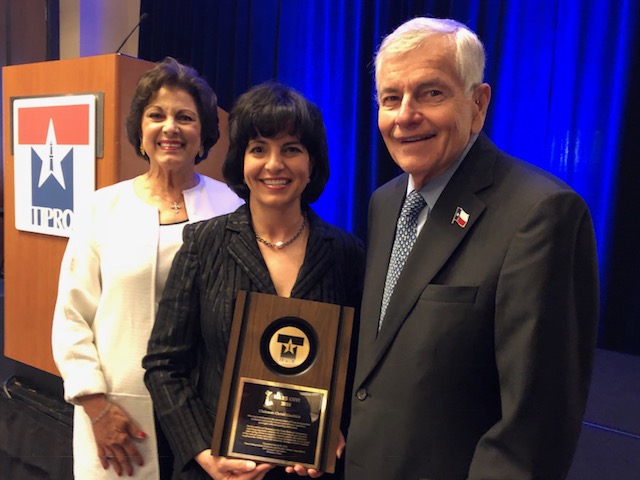
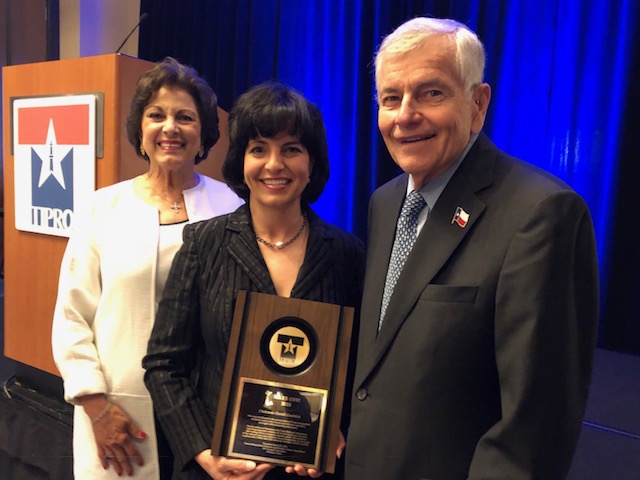
RRC Chairman Craddick is congratulated by her parents, Nadine & the Hon. Tom Craddick.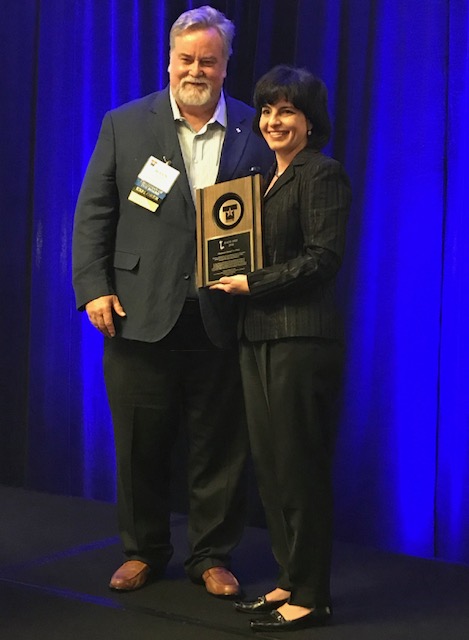
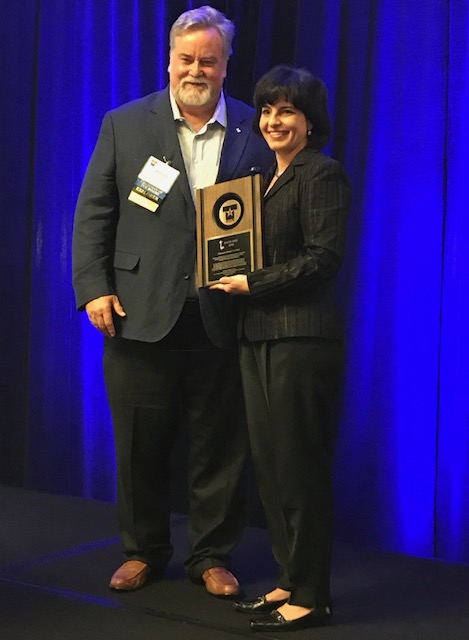 RRC Chairman Craddick is presented with TIPRO’s Hats Off 2018 Award by TIPRO Chairman Allen Gilmer.
RRC Chairman Craddick is presented with TIPRO’s Hats Off 2018 Award by TIPRO Chairman Allen Gilmer.Christi Craddick was elected statewide by the people of Texas in November 2012 to serve a six-year term as Texas Railroad Commissioner. A native of Midland, Christi is an attorney specializing in oil and gas, water, tax issues, electric deregulation and environmental policy.
Chairman Craddick Furthers Efficiency, Modernization of RRC
Releases Texas Oilfield Relief Initiative Phase Two March 27, 2018
AUSTIN – Railroad Commission Chairman Christi Craddick today announced the second phase of the Texas Oilfield Relief Initiative as part of an ongoing effort to streamline regulation at the agency. The initiative reduces administrative requirements on the oil and gas industry while ensuring the public and environment are protected.
“At the Railroad Commission, we are removing unnecessary burdens on business and implementing technology upgrades that allow our staff, the public and industry to access and submit data and information in an easier, more efficient manner,” Craddick said.
“Key changes like these are part of our overall goal to modernize the agency, ultimately saving staff time and reducing the cost of doing business at the Commission.
“The recommendation to reduce W-10 testing requirements, eliminating data our staff no longer needs, is estimated to save the oil industry approximately $52 million a year,” Craddick said. “These cost-savings can then be passed on to create more jobs for Texans and generate more revenue for state coffers through increased energy production.”
The initiative results from a review of the Railroad Commission’s regulatory processes and takes careful consideration to maintain the strength of public and environmental protections, correlative rights and measures designed to prevent the waste of resources.
Phase two of Chairman Craddick’s Texas Oilfield Relief Initiative includes the following items:
- Identify agency reporting requirements that can be eliminated while maintaining strong environmental protections, saving staff and industry time and costs.
- After the initial Oil Well Status Report (W-10) test or optional allocation, operators may choose to eliminate subsequent W-10 tests and filings except for limited circumstances, including:
- recompletion of the well into a different regulatory field
- reclassification of the well from gas to oil
- resume production from a well classified as inactive as defined in §3.15 (relating to Surface Equipment Removal Requirements and Inactive Wells)
- reinstate an allowable
- as required by Commission order, special field rule, or other rule
- Operators of wells listed on the proration schedule must continue to report the producing or shut-in status of each well on the annual well status report.
- After the initial Oil Well Status Report (W-10) test or optional allocation, operators may choose to eliminate subsequent W-10 tests and filings except for limited circumstances, including:
- Modify the agency’s Geographic Information System mapping tool to allow for an area of review to be identified and downloadable in a CSV file for easier public and industry use.
- Expand online use of forms for easier compliance and transmittal of information, saving staff and industry time and costs.
- Modify Acreage Designation data sheets (P-16, Attachments 1A and 2A) to allow staff and industry to utilize a downloadable file for easier manipulation.
- Improve the agency’s online system to allow industry to file a blanket Producer’s Transportation Authority and Certificate of Compliance (P-4) form for gatherers by lease or by operator rather than changing the name on each well, saving staff and industry time and costs.
The initiative’s recommendations are currently in the process of being implemented with the exception of rule amendments related to W-10 testing requirements. Staff anticipates amendments to W-10 testing requirements will be presented at an upcoming Railroad Commission conference.
Phase one of the Texas Oilfield Relief Initiative was launched in 2016 and successfully completed last year. More information on phase one of the initiative can be found here.
Christi Craddick was elected statewide by the people of Texas in November 2012 to serve a six-year term as Texas Railroad Commissioner. A native of Midland, Christi is an attorney specializing in oil and gas, water, tax issues, electric deregulation and environmental policy.
- Identify agency reporting requirements that can be eliminated while maintaining strong environmental protections, saving staff and industry time and costs.
RRC Enforcement Actions Taken at Commissioners’ March 20 Conference
March 22, 2018
AUSTIN – The Railroad Commission of Texas assessed $279,188 in fines involving 215 enforcement dockets against operators and businesses at the Commissioners’ conference this week. The Commission has primary oversight and enforcement of the state’s oil and gas industry and intrastate pipeline safety.
Operators were ordered to come into compliance with Commission rules and assessed $20,213 for oil and gas, LP-Gas and pipeline safety rule violations. Pipeline operators and excavators were assessed $258,975 for violations of the Commission’s Pipeline Damage Prevention rules. Details on all these Master Agreed Orders can be found on the RRC website here.
In the absence of timely motions for rehearing, decisions are final as stated in these final orders.
A Hypocritical “Hero”
March 15, 2018
AUSTIN - News organizations are welcome to post or publish this editorial by Railroad Commissioner Wayne Christian in their respective publications or websites.
A Hypocritical “Hero”By Railroad Commissioner Wayne ChristianArnold Schwarzenegger is undoubtedly best known for his legendary heroics on the silver screen. Covered in mud, he survives the Predator – killing it by exploiting its one weakness. As the Terminator, he protects John Connor from a homicidal shape-shifting machine to save humanity. An unhappy construction worker, he can’t remember who he is, but finally recalls and with his last breath saves thousands of lives by releasing air into the Martian atmosphere.
Like the character he played in Total Recall, Mr. Schwarzenegger must be having a tough time remembering who he is – a former Republican Governor.
In Austin for the South by Southwest festival, he revealed he has hired a team of California lawyers to sue oil and gas companies for “first degree murder” by “knowingly killing people all over the world.” Instead of acting like a Republican, Mr. Schwarzenegger must be trying to play the hero again. The only problem is this isn’t the movies, this is real life, and there is nothing to “save” us from.
Like many of us, Mr. Schwarzenegger had a long commute to work. After he was elected Governor of California, he decided not to move to the Governor’s Mansion at the state capitol in Sacramento, but instead traveled more than 100 miles for seven years from his mansion in Brentwood, Calif.. The only difference: he took a private jet, which cost around $30,000 a roundtrip and impacts the environment about the same amount as a small car does in three years. And when he’s not taking a private jet to work, he’s driving around in a five-ton,12-mile to the gallon Mercedes or going to lunch in a military-grade Hummer.
But now, according to the Governator it’s “absolutely irresponsible” for oil and gas companies to sell their products because they “know [their] product is killing people.” Wait a minute, here. So, it’s okay for oil and gas companies to sell their products to Mr. Schwarzenegger when he needs to fill up his private jet or Hummer, but it’s not okay for them to sell their products to regular folks so they can drive their vehicles to work? This kind of do-as-I-say-not-as-I-do hypocrisy is repulsive and offensive. Mr. Schwarzenegger is not a hero, he’s just another elitist Hollywood hypocrite telling you and me how to best live our lives.
The real heroes are the oil and gas workers – the landman, the roughneck, the petroleum engineer – who wake up every day and go to work to support their families and our way of life. Together, these workers produce around 10 million barrels of oil and 96 billion cubic feet of natural gas each day that fuel our cars, light our homes, and make plastics and many other items we use every day. The industry doesn’t just provide the raw materials to make the things we need – it creates jobs and grows our economy. In 2015, the oil and gas industry supported more than 10 million jobs in the United States with an average salary over $100,000 and contributes more than $1 trillion to our economy every year.
Despite what Mr. Schwarzenegger may think, the story of energy before oil and gas was simple – most work was done by human or animal muscle. This caused the vast majority of the population to live short lives of hard labor in extreme poverty. Before oil and gas were used to power the industrial revolution, the global average life expectancy was only 25 years old with 30 percent of children dying before age 15. During the 1800s, 80 to 90 percent of the population of the United States worked in agriculture and spent 74 percent of family income on food, clothing and shelter. Today, the average person lives more than three times longer than the average person in 1800. This is partly because climate-related deaths, such as starvation or hypothermia, have decreased 98 percent in the United States since the use of oil and gas became widespread at the beginning of the 20th Century.
It’s sad – but Mr. Schwarzenegger has gone from superstar hero to Hollywood hypocrite. On the one hand he routinely uses gas-guzzling jets and cars while on the other he sues oil and gas companies. Given this stunning hypocrisy, I have a question. If oil and gas companies are murderers for selling their product, does that make Mr. Schwarzenegger an accessory for being such a good customer?
A lifelong conservative businessman, Wayne Christian was elected to join the Railroad Commission of Texas in November 2016. In 1996, Christian was elected to the House of Representatives. During this time, Christian served as Vice-Chair of Regulated Industries and as a multi-term member of the Energy Resource Committee. On these committees, he had direct oversight of the Railroad Commission and accumulated a strong record of standing for free markets and against burdensome regulations.
Texas Drilling Permits and Completions Statistics for February 2018
March 09, 2018
AUSTIN – The Railroad Commission of Texas (Commission) issued a total of 1,097 original drilling permits in February 2018 compared to 991 in February 2017. The February total included 975 permits to drill new oil or gas wells, 15 to re-enter plugged well bores and 107 for re-completions of existing well bores. The breakdown of well types for those permits issued February 2018 included 284 oil, 87 gas, 647 oil or gas, 68 injection, zero service and 11 other permits.
In February 2018, Commission staff processed 672 oil, 149 gas, 56 injection and five other completions compared to 533 oil, 95 gas, 49 injection and zero other completions in February 2017. Total well completions processed for 2018 are 1,845; up from 1,213 recorded in 2017.
According to Baker Hughes Inc., the Texas rig count as of March 9 was 490, representing about 50 percent of all active rigs in the United States.
For additional drilling permit and completion statistics, visit the Commission’s monthly drilling completion summaries web page.TABLE 1 – FEBRUARY 2018 TEXAS OIL AND GAS DRILLING PERMITS AND COMPLETIONS BY RAILROAD COMMISSION OF TEXAS DISTRICT*
DISTRICT
PERMITS TO DRILL OIL/GAS HOLES
OIL COMPLETIONS
GAS COMPLETIONS
(1) SAN ANTONIO AREA
131
40
3
(2) REFUGIO AREA
112
26
27
(3) SOUTHEAST TEXAS
45
24
8
(4) DEEP SOUTH TEXAS
43
7
8
(5) EAST CENTRAL TX
18
7
1
(6) EAST TEXAS
62
8
21
(7B) WEST CENTRAL TX
38
28
2
(7C) SAN ANGELO AREA
62
75
0
(8) MIDLAND
455
401
49
(8A) LUBBOCK AREA
56
10
0
(9) NORTH TEXAS
52
41
17
(10) PANHANDLE
23
5
13
TOTAL
1,097
672
149
* A district map is available on the Railroad Commission of Texas here.
Craddick: Ethanol mandates help Wall Street, and hurt Texas
March 08, 2018
HOUSTON – In case you missed it, please see Railroad Commission Chairman Christi Craddick’s editorial on reforming the Renewable Fuel Standard (RFS) and capping Renewable Identification Numbers (RINs) prices, as published in the Houston Chronicle today. The editorial can be read online here and below. News organizations are welcome to post or publish this editorial in their respective publications or websites.
Ethanol mandates help Wall Street, and hurt Texas
By Chairman Christi Craddick
The Lone Star State is blessed with strong energy and agriculture industries, both of which sustain thousands of jobs all over our state and play an important role to our national and economic security.The mining and utilities industry is the largest contributor to Texas' GDP, and the food and fiber system is ranked second.
Unfortunately, both industries are falling victim to a broken regulatory framework out of Washington, D.C. Right now, there is debate surrounding the Renewable Fuel Standard (RFS), a federal program requiring transportation fuels to contain a certain amount of renewable resources such as ethanol, specifically as it regards the price of Renewable Identification Numbers (RINs).
The EPA made up RINs with the goal of designing a minimally burdensome enforcement mechanism for the RFS. In fact, when they were first introduced, RINs sold for a penny or two each. Now, however, RIN prices have skyrocketed and cost as high as $1.40 each. These increased costs are putting considerable pressure on Texas refiners as they have had to direct more and more of their bottom line to paying these fees, rather than reinvesting in the state's economy. As a result, thousands of Texas refinery jobs are at risk.
The most unfortunate part about the RINs system is that those who benefit from it are neither corn farmers nor refinery workers, but rather Wall Street speculators who reap profits from RINs.
Our own governor recognized the threat of high RIN prices on Texans' jobs and wrote to the EPA asking for relief, explaining that "current implementation of this dated federal mandate severely impacts Texas' otherwise strong economy and jeopardizes the employment of hundreds of thousands of Texans. "
And U.S. Senator Ted Cruz, R-Texas, is currently leading the effort in Washington to defend the interests of Texans from this broken system. Senator Cruz has called for a "win-win" solution that will simultaneously bring RINs prices down and protect Texas refinery jobs, while enabling Texas farmers to grow and sell more corn.
The White House is meeting with senators from Texas and the Midwest and interests representing ethanol producers, refiners and unions. Negotiations are ongoing.
Senator Cruz and those working to achieve a fair and reasonable solution are focused on allowing all industries across the state to grow — from agriculture, to oil and gas, to renewable and alternative sources of energy — and take full advantage of the agricultural and energy resources we have right here at home. Texans should support efforts to reform the RFS and cap RIN prices, for the good of the Texas economy and all Texans.
Christi Craddick was elected statewide by the people of Texas in November 2012 to serve a six-year term as Texas Railroad Commissioner. A native of Midland, Christi is an attorney specializing in oil and gas, water, tax issues, electric deregulation and environmental policy.
February
Texas Oil and Gas Production Statistics for December 2017
February 26, 2018
AUSTIN –– Production for December 2017 as reported to the Railroad Commission of Texas (Commission) is 78,085,085 barrels of crude oil and 514,503,830 mcf (thousand cubic feet) of total gas from oil and gas wells. These preliminary figures are based on production volumes reported by operators and will be updated as late and corrected production reports are received. Production reported to the Commission for December 2016, was: 74,254,312 barrels of crude oil preliminarily, updated to a current figure of 86,259,570 barrels; and 566,772,368 mcf of total gas preliminarily, updated to a current figure of 652,355,569 mcf.
The Commission reports that from January 2017 to December 2017 total Texas reported production was 1.03 billion barrels of crude oil and 7.6 trillion cubic feet of total gas. Crude oil production reported by the Commission is limited to oil produced from oil leases and does not include condensate, which is reported separately by the Commission.
Texas preliminary December 2017 crude oil production averaged 2,518,874 barrels daily, compared to the 2,395,300 barrels daily average of December 2016.
Texas preliminary December 2017 total gas production averaged 16,596,898 mcf a day, compared to the 18,282,980 mcf daily average of December 2016.
Texas production in December 2017 came from 180,860 oil wells and 92,289 gas wells.
For additional oil and gas production statistics, including the ranking of each Texas County by crude oil, total gas and condensate production, visit the RRC’s website.TABLE 1 – DECEMBER 2017 TEXAS TOP TEN CRUDE OIL PRODUCING COUNTIES RANKED BY PRELIMINARY PRODUCTION
RANK
COUNTY
CRUDE OIL (BBLS)
1. MIDLAND
7,730,833
2. KARNES
5,519,421
3. REEVES
4,615,578
4. UPTON
4,363,940
5. MARTIN
4,318,134
6. LOVING
4,001,566
7. LA SALLE
3,901,178
8. DE WITT
3,081,642
9. ANDREWS
3,005,150
10. REAGAN
2,563,790
TABLE 2 – DECEMBER 2017 TEXAS TOP TEN TOTAL GAS (GAS WELL GAS & CASINGHEAD) PRODUCING COUNTIES RANKED BY PRELIMINARY PRODUCTIONRANK
COUNTY
TOTAL GAS (MCF)
1. WEBB
35,845,073
2. TARRANT
33,354,811
3. REEVES
21,679,438
4. MIDLAND
19,443,382
5. KARNES
17,499,379
6. PANOLA
16,984,160
7. DE WITT
15,869,707
8. LOVING
15,558,163
9. WISE
13,474,186
10. UPTON
13,426,892
TABLE 3 – DECEMBER 2017 TEXAS TOP TEN TOTAL CONDENSATE PRODUCING COUNTIES RANKED BY PRELIMINARY PRODUCTIONRANK
COUNTY
CONDENSATE (BBLS)
1. CULBERSON
1,034,503
2. DE WITT
920,042
3. KARNES
863,480
4. REEVES
820,683
5. WEBB
774,690
6. LOVING
530,287
7. LIVE OAK
393,914
8. DIMMIT
338,628
9. LA SALLE
242,762
10. HEMPHILL
140,489
Commissioner Ryan Sitton Participates in Town Hall Discussing Fort Bend Oil Well Blowout
February 21, 2018
AUSTIN — Texas Railroad Commissioner Ryan Sitton participated in a town hall hosted yesterday by Sen. Borris Miles and Rep. Ron Reynolds to provide updates and answer questions regarding an oil well blowout that occurred in Fort Bend County on Dec. 6, 2017. While drilling the well, IWR Operating encountered a gas pocket and experienced a blowout, causing a release of 3,300 barrels of crude oil in a 500-foot radius on the drilling pad site. The incident caused a foul odor to be emitted, which led to concerns within the community for health and safety. The Texas Commission on Environmental Quality (TCEQ) also participated in the town hall and provided information and answered questions related to air quality monitoring that agency had done.
The Texas Commission on Environmental Quality extensively tested the area where odors were noted and found no health risks. In addition, Houston Fire Department’s HazMat Senior Captain Johnson presented information related to their monitoring and assessment of air quality in the immediate aftermath of the blowout, finding no harmful levels of air toxins present.
In the days following the blowout, 90 percent of the hydrocarbon release was recovered from reserve pits on the drilling location with the additional 10 percent recovered in soil excavation. The well was plugged on Dec. 19, 2017, and all remediation and clean up was reported by the operator as completed on February 9, 2018.
“I work directly for the 27 million Texans of this state and it’s my duty and commitment as Railroad Commissioner to ensure that they feel confident in the way oil and gas companies are operating in their communities,” Sitton said.
“Nothing is more important than public and environmental safety, and I’m extremely appreciative of Sen. Miles and Rep. Reynolds bringing together the community to address their concerns and provide the facts. No one likes it when incidents like this occur, but the Railroad Commission is committed to ensuring that remediation is done according to required standards and that drilling operators follow all prescribed rules.”
For more questions and more information, please reach out to ryan.sitton@rrc.texas.gov.
Commissioner Ryan Sitton and Sen. Borris Miles answer questions from the
audience on Feb. 20, 2018 at Together We Stand Church in Missouri City, Texas.
Ryan Sitton was elected to the Railroad Commission in 2014 and is the first engineer to serve on the Commission in 50 years. Sitton is one of the world’s leading energy experts and founded PinnacleART, an engineering and technology company focused on reliability and integrity programs for the oil, gas, and petrochemical, mining, pharmaceutical, and wastewater industries. As Railroad Commissioner, Sitton uses his technical expertise and business experience to make decisions for the state that are based on sound science and employs a fiscally conservative approach to prioritize the agency’s efforts.RRC Enforcement Actions Taken at Commissioners’ Feb. 13 Conference
February 15, 2018
AUSTIN – The Railroad Commission of Texas assessed $384,615 in fines involving 231 enforcement dockets against operators and businesses at the Commissioners’ conference last week. The Commission has primary oversight and enforcement of the state’s oil and gas industry and intrastate pipeline safety.
One operator was assessed $18,100 in an oil and gas docket that went to hearing. The final order for Oil & Gas Docket 8A-0301472 can be found on the RRC website here.Operators were assessed $32,153 after failing to appear at Commission enforcement proceedings.
Details on these Master Default Orders can be found on the RRC website here.Operators were ordered to come into compliance with Commission rules and assessed $65,362 for oil and gas, LP-Gas and pipeline safety rule violations. Pipeline operators and excavators were assessed $269,000 for violations of the Commission’s Pipeline Damage Prevention rules.
Details on all these Master Agreed Orders can be found on the RRC website here.In the absence of timely motions for rehearing, decisions are final as stated in these final orders.
Texas Drilling Permits and Completions Statistics for January 2018
February 09, 2018
AUSTIN – The Railroad Commission of Texas (Commission) issued a total of 1,166 original drilling permits in January 2018 compared to 956 in January 2017. The January total included 1,036 permits to drill new oil or gas wells, 18 to re-enter plugged well bores and 112 for re-completions of existing well bores. The breakdown of well types for those permits issued January 2018 included 243 oil, 78 gas, 784 oil or gas, 55 injection, two service and four other permits.
In January 2018, Commission staff processed 739 oil, 179 gas, 44 injection and one other completions compared to 418 oil, 84 gas, 31 injection and three other completions in January 2017. Total well completions processed for 2018 are 963; up from 536 recorded in 2017.
According to Baker Hughes Inc., the Texas rig count as of February 9 was 479, representing about 49 percent of all active rigs in the United States.
For additional drilling permit and completion statistics, visit the Commission’s monthly drilling completion summaries web page.
TABLE 1 – JANUARY 2018 TEXAS OIL AND GAS DRILLING PERMITS AND COMPLETIONS BY RAILROAD COMMISSION OF TEXAS DISTRICT*DISTRICT
PERMITS TO DRILL OIL/GAS HOLES
OIL COMPLETIONS
GAS COMPLETIONS
(1) SAN ANTONIO AREA
159
67
48
(2) REFUGIO AREA
96
21
17
(3) SOUTHEAST TEXAS
39
16
6
(4) DEEP SOUTH TEXAS
25
7
10
(5) EAST CENTRAL TX
9
5
4
(6) EAST TEXAS
58
6
40
(7B) WEST CENTRAL TX
51
9
4
(7C) SAN ANGELO AREA
89
73
1
(8) MIDLAND
514
460
34
(8A) LUBBOCK AREA
53
17
0
(9) NORTH TEXAS
48
45
5
(10) PANHANDLE
25
13
10
TOTAL
1,166
739
179
* A district map is available on the Railroad Commission of Texas here.
Updates to RRC’s “Call Before You Dig” Requirements Take Effect Feb. 12
Rule Changes Strengthen Public Safety February 08, 2018
AUSTIN – Effective next Monday, Feb. 12, Railroad Commission pipeline damage prevention rules require excavators who strike a pipeline while digging to notify the pipeline operator by calling the 811- notification center as soon as possible, but no later than one hour after an incident. Excavators must also call 911 if any natural gas or other product is released when an underground pipeline is struck. These rule updates extend the deadline for pipeline operators and excavators to file a damage report with the Railroad Commission from the current 10 days to 30 days.
More information on these new rule requirements can be found under "Chapter 18. Underground Pipeline Damage Prevention." on the RRC website
RRC rules already require anyone planning to dig deeper than 16 inches to call 811 before they dig to prevent damage to underground pipelines. The required 811 call prompts pipeline operators to mark their underground natural gas or hazardous liquid pipelines to avoid being struck during the digging process. Failure to obey the “Call Before You Dig” rules can result in penalties and fines.
Commissioner Ryan Sitton to Reveal 2018 Energy Market Outlook at NAPE Summit
February 05, 2018
AUSTIN — Texas Railroad Commissioner Ryan Sitton will discuss worldwide supply and demand, the impact of OPEC’s production cuts on America’s energy opportunities, and reveal predictions from his 2018 energy market report at the 2018 NAPE Summit on Feb. 9 at 11:15 a.m. in Houston.
At the beginning of 2017, Sitton predicted that the price of West Texas Intermediate crude oil would reach $60 per barrel before the end of the year, and it did. At the 2018 NAPE Summit, attendees will find out exactly where oil prices are heading, what trends will impact the market, what the Railroad Commission is doing to work with the energy industry in this time of record growth, and how Texas and the United States are poised to meet energy demand around the world.WHO: Ryan Sitton, Texas Railroad Commissioner
WHAT: 2018 Energy Market Outlook — NAPE
WHEN: Friday, Feb. 9, 2018
11:15 – 11:45 a.m.
WHERE: Domestic Theater, Hall C, 1st FloorGeorge R. Brown Convention Center
1001 Avenida De Las Americas
Houston, TX 77010
MEDIA OPPORTUNITIES:- One-page handout of energy market analysis
- Videos/photos of Commissioner Sitton’s address
- One-on-one interviews with Commissioner Sitton
Ryan Sitton was elected to the Railroad Commission in 2014 and is the first engineer to serve on the Commission in 50 years. Sitton is one of the world’s leading energy experts and founded PinnacleART, an engineering and technology company focused on reliability and integrity programs for the oil, gas, and petrochemical, mining, pharmaceutical, and wastewater industries. As Railroad Commissioner, Sitton uses his technical expertise and business experience to make decisions for the state that are based on sound science and employs a fiscally conservative approach to prioritize the agency’s efforts.
January
Commissioner Sitton Talks Energy and Leadership with Lewisville Area Chamber of Commerce
January 30, 2018
AUSTIN – At the request of Sen. Jane Nelson, Railroad Commissioner Ryan Sitton today visited with a group of community and business leaders from Leadership Lewisville, a program of the Lewisville Area Chamber of Commerce. Sitton shared lessons he has learned in his experience as a small business owner and public servant as well as his commitment to responsible energy development.
The group discussed the Railroad Commission’s essential duties, the energy market in 2018 and their personal and business goals.
“Sen. Nelson is to be commended for bringing such a talented, and promising, group of professionals to the Capitol to learn about the functions and duties of their state government,” Sitton said.
“Energy is the backbone of the Texas economy and it’s crucial that local leaders understand the role of the Railroad Commission and the importance of energy to our local, state and national economic security. One of my top priorities as Railroad Commissioner has been to educate Texans all over the state about the important role the agency plays in energy development and how important energy is to every Texan.”

Ryan Sitton was elected to the Railroad Commission in 2014 and is the first engineer to serve on the Commission in 50 years. Sitton is one of the world’s leading energy experts and founded PinnacleART, an engineering and technology company focused on reliability and integrity programs for the oil, gas, and petrochemical, mining, pharmaceutical, and wastewater industries. As Railroad Commissioner, Sitton uses his technical expertise and business experience to make decisions for the state that are based on sound science and employs a fiscally conservative approach to prioritize the agency’s efforts.
IT Solution Increases Agency Efficiency
Saves Industry Thousands of Dollars January 29, 2018
AUSTIN – This month marks one year since the Railroad Commission launched a new electronic well log filing system, which has saved more than $300,000 for industry and thousands of man-hours for the agency to date. In the past, operators were required to print and mail in hundreds of pages that they already had electronically, but now have the option to upload the files, making it easier to do business with the Railroad Commission. Reducing the burden from this outdated system has allowed RRC staff to reallocate time away from scanning documents and focus on other important projects that modernize the agency.
This technology update is one of many Railroad Commissioner Ryan Sitton has spearheaded in an effort to put his engineering and IT background to use for taxpayers. As the Commission utilizes budget resources this next biennium, Sitton will continue to push for smart IT solutions.
“The Railroad Commission has long been a leader in energy regulation, but we are behind the curve in technology modernization,” Sitton said.
“We owe it to the taxpayers we serve to be the most efficient, effective agency we can be, and a huge part of that is eliminating decades-old practices and instead opting for affordable, off-the-shelf IT solutions. Every dollar we save the state and the industry is another dollar invested in our economy, schools, roads and hospitals.”
A recent internal IT assessment revealed the well log system has been rated highest for customer satisfaction. Since its launch, the system has received approximately 8,000 submissions, saving the RRC nearly $50,000 in staff time and scans.
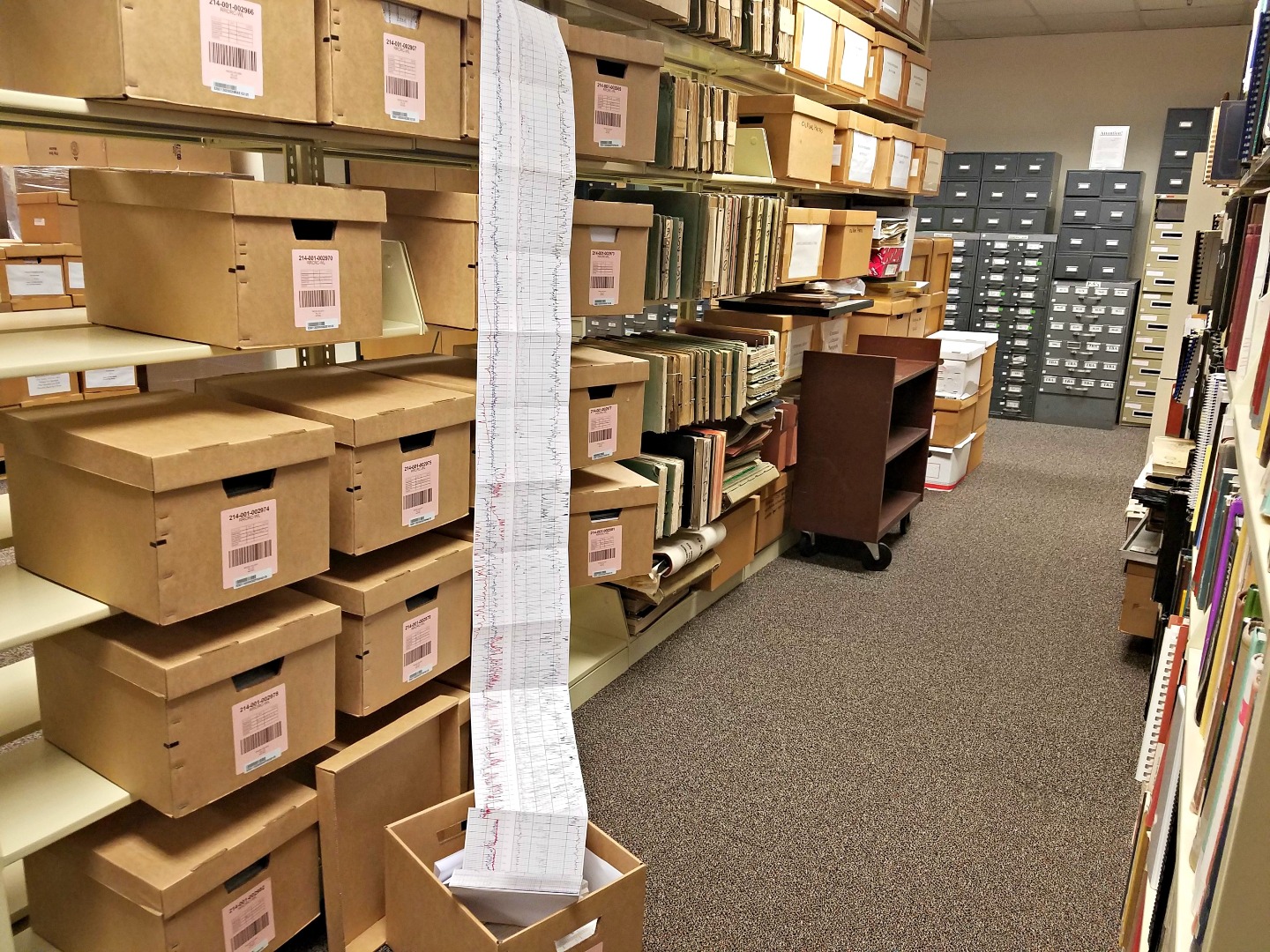
Ryan Sitton was elected to the Railroad Commission in 2014 and is the first engineer to serve on the Commission in 50 years. Sitton is one of the world’s leading energy experts and founded PinnacleART, an engineering and technology company focused on reliability and integrity programs for the oil, gas, and petrochemical, mining, pharmaceutical, and wastewater industries. As Railroad Commissioner, Sitton uses his technical expertise and business experience to make decisions for the state that are based on sound science and employs a fiscally conservative approach to prioritize the agency’s efforts
RRC Enforcement actions taken at Commissioners January 23 Conference
January 26, 2018
AUSTIN – The Railroad Commission of Texas assessed $891,086 in fines involving 392 enforcement dockets against operators and businesses at the Commissioners’ conference this week. The Commission has primary oversight and enforcement of the state’s oil and gas industry and intrastate pipeline safety.
Operators were assessed $200,355 after failing to appear at Commission enforcement proceedings. Details on these Master Default Orders can be found on the RRC website here.
Operators were ordered to come into compliance with Commission rules and assessed $200,876 for oil and gas, LP-Gas and pipeline safety rule violations. Pipeline operators and excavators were assessed $489,875 for violations of the Commission’s Pipeline Damage Prevention rules. Details on all these Master Agreed Orders can be found on the RRC website here.
In the absence of timely motions for rehearing, decisions are final as stated in these final orders.Texas Oil and Gas Production Statistics for November 2017
January 25, 2018
AUSTIN –– Production for November 2017 as reported to the Railroad Commission of Texas (Commission) is 75,573,142 barrels of crude oil and 543,212,976 mcf (thousand cubic feet) of total gas from oil and gas wells. These preliminary figures are based on production volumes reported by operators and will be updated as late and corrected production reports are received. Production reported to the Commission for November 2016, was: 72,322,284 barrels of crude oil preliminarily, updated to a current figure of 83,156,082 barrels; and 571,259,135 mcf of total gas preliminarily, updated to a current figure of 647,261,024 mcf.
The Commission reports that from December 2016 to November 2017, total Texas reported production was 1.012 billion barrels of crude oil and 7.6 trillion cubic feet of total gas. Crude oil production reported by the Commission is limited to oil produced from oil leases and does not include condensate, which is reported separately by the Commission.
Texas preliminary November 2017 crude oil production averaged 2,519,105 barrels daily, compared to the 2,410,743 barrels daily average of November 2016.
Texas preliminary November 2017 total gas production averaged 18,107,099 mcf a day, compared to the 19,041,971 mcf daily average of November 2016.
Texas production in November 2017 came from 180,060 oil wells and 92,177 gas wells.
For additional oil and gas production statistics, including the ranking of each Texas County by crude oil, total gas and condensate production, visit the RRC’s website.TABLE 1 – NOVEMBER 2017 TEXAS TOP TEN CRUDE OIL PRODUCING COUNTIES RANKED BY PRELIMINARY PRODUCTION
RANK
COUNTY
CRUDE OIL (BBLS)
1. MIDLAND
7,953,990
2. KARNES
5,737,677
3. UPTON
4,359,426
4. MARTIN
4,013,533
5. REEVES
3,856,443
6. LOVING
3,666,484
7. LA SALLE
3,343,559
8. DE WITT
3,007,723
9. REAGAN
2,951,999
10. ANDREWS
2,838,305
TABLE 2 – NOVEMBER 2017 TEXAS TOP TEN TOTAL GAS (GAS WELL GAS & CASINGHEAD) PRODUCING COUNTIES RANKED BY PRELIMINARY PRODUCTIONRANK
COUNTY
TOTAL GAS (MCF)
1. WEBB
55,228,511
2. TARRANT
33,501,111
3. MIDLAND
20,119,640
4. KARNES
18,173,372
5. REEVES
18,035,197
6. PANOLA
17,062,296
7. JOHNSON
16,582,620
8. DE WITT
15,754,657
9. LA SALLE
15,083,393
10. WISE
14,458,120
TABLE 3 – NOVEMBER 2017 TEXAS TOP TEN TOTAL CONDENSATE PRODUCING COUNTIES RANKED BY PRELIMINARY PRODUCTION
1. CULBERSON
975,867
2. DE WITT
880,917
3. KARNES
812,496
4. WEBB
762,790
5. REEVES
465,648
6. LOVING
411,063
7. LIVE OAK
388,062
8. DIMMIT
317,646
9. LA SALLE
207,342
10. WHEELER
145,342
Chairman Craddick Directs RRC to Ensure Federal Tax Cuts Benefit Gas Customers
Orders Review of Tax Cut Impacts on Gas Utility Rates January 23, 2018
AUSTIN – Railroad Commission Chairman Christi Craddick today directed RRC staff to assess the impact of the Tax Cuts and Jobs Act of 2017 on Texas gas utility rates to ensure companies pass on to customers the savings resulting from the corporate tax reduction. The Act reduced the corporate tax rate from 35 percent to 21 percent as of January 1, 2018.
“These tax cuts are significant, and as a regulator, our role is to make sure Texas utilities implement them in a way that benefits consumers first,” Craddick said.
“Considering President Trump’s tax reform plan and the reduced corporate tax rate, we will look at the effect on gas rates to guarantee companies share their savings with their customers, allowing Texans to keep more of their paycheck as the Act intended.”
Christi Craddick was elected statewide by the people of Texas in November 2012 to serve a six-year term as Texas Railroad Commissioner. A native of Midland, Christi is an attorney specializing in oil and gas, water, tax issues, electric deregulation and environmental policy.
Craddick: When it Comes to NAFTA, Mend it. Don’t end it.
January 17, 2018
HOUSTON – In case you missed it, please see Railroad Commission Chairman Christi Craddick’s editorial on the importance of the North American Free Trade Agreement (NAFTA) for Texas and the state’s energy industry, as published in the Houston Chronicle last week. The editorial can be read online here and below. News organizations are welcome to post or publish this editorial in their respective publications or websites.
When it Comes to NAFTA, Mend it. Don’t end it.By Chairman Christi Craddick
Many Texans support NAFTA based on the premise that it allows American workers and businesses to compete on a level playing field with anyone in the world.President Trump has tapped into the concern of many workers that international trade is too often tilted against American interests. From the dumping of Chinese steel to foreign governments propping up domestic companies for an unfair competitive advantage, there are legitimate concerns about trade practices that harm American industry.
When you couple these concerns with a confiscatory tax policy that sends jobs and investment overseas, American industry - particularly American manufacturing - has been losing jobs for a generation.
But Texans know when it comes to trade agreements like NAFTA, the answer is to mend it, not end it. President Trump must be urged to recognize the agreement's importance to our state, because the alternative would be detrimental to the Texas and American economy.
Texas is the gateway to trade with Latin America. We're also the nation's leading exporter to our southern neighbor. Our people, products and innovations flow south in record numbers, not only creating opportunities abroad, but jobs back home.
And with the privatization of the Mexican energy sector, new opportunities are emerging that will unleash energy jobs, opportunity and investment in Texas and across the United States.
In the last two years, natural gas exports to Mexico have doubled. Over the course of the next two years, six new pipelines will open, carrying American gas south to Mexico. This new dynamic is a big part of the reason that the United States became a net exporter of natural gas for the first time in 60 years this past June, boosting not only our state's economy but security abroad for our friends and allies. It's also expected that offshore leasing of Mexican oil fields could reach $50 billion in investment.
As the U.S. seeks to re-negotiate NAFTA, the Office of the United States Trade Representative describes its energy policy goals to, "Preserve and strengthen investment, market access, and state-owned enterprise disciplines benefitting energy production and transmission and support North American energy security and independence, while promoting continuing energy market-opening reforms." If these goals are met, it will mean energy growth and prosperity for Texas and the U.S.
As a state with a 1,254-mile international border, we also know how critical it is that we cooperate with our North American neighbors on grid interconnections. Grid stability benefits from the international exchange of energy and electricity resources.
Investments in a diverse energy supply, the means to transport energy resources, and the generation of conventional and renewable sources is vital to our future. Doing it as North American partners is just as critical.
We need a North American energy strategy, in partnership with Mexico and Canada, that leverages our shared energy potential. We can achieve energy security as a continent, greatly reducing our reliance on hostile sources of energy, if we work across shared borders to advance shared economic and security interests.
Doing this requires not withdrawing from NAFTA or harming longstanding trade relationships with our neighbors, but sitting down to hash out agreements about renewable standards and environmental commitments, focusing on joint infrastructure projects, and agreeing to 21st century rules and regulations that advance our collective prosperity.
Protectionist policies, though well-meaning, could greatly harm American investments in Mexican energy fields and our shared goal of North American energy security. That is a non-starter for Texas and it must be a non-starter for President Trump.
Christi Craddick was elected statewide by the people of Texas in November 2012 to serve a six-year term as Texas Railroad Commissioner. A native of Midland, Christi is an attorney specializing in oil and gas, water, tax issues, electric deregulation and environmental policy.
Craddick: Texas is the National Leader in Energy Production, Transport, and Export
January 12, 2018
HOUSTON – Railroad Commission Chairman Christi Craddick today delivered keynote remarks to the Texas Pipeline Association’s (TPA) annual meeting in Houston. TPA is the largest state trade association in the country representing the interests of the intrastate pipeline network in Texas.
“Texas companies are safely delivering record amounts of energy to market, generating a stronger, more prosperous economy for our state and the country, and that’s thanks in large part to our state’s extensive network of pipelines,” Craddick said.
“Over the next few years, as new pipelines transporting natural gas into Mexico and carrying oil to Texas’ Gulf Coast ports come online, U.S. energy exports are projected to see enormous growth.”
Since Congress lifted the nation’s ban on crude oil exports at the end of 2015, U.S. oil exports have risen to almost 2 million barrels per day. Driven by Permian production and pipeline growth, experts expect the U.S. could become a net crude exporter as soon as 2019.
“The Railroad Commission’s pipeline safety program is proud to provide strong regulatory oversight of almost 400,000 pipeline miles and this important industry,” Craddick said.
Christi Craddick was elected statewide by the people of Texas in November 2012 to serve a six-year term as Texas Railroad Commissioner. A native of Midland, Christi is an attorney specializing in oil and gas, water, tax issues, electric deregulation and environmental policy.
Texas Drilling Permits and Completions Statistics for December 2017
January 09, 2018
AUSTIN –– The Railroad Commission of Texas (Commission) issued a total of 885 original drilling permits in December 2017 compared to 1,009 in December 2016. The December total included 792 permits to drill new oil or gas wells, 8 to re-enter plugged well bores and 85 for re-completions of existing well bores. The breakdown of well types for those permits issued December 2017 included 175 oil, 67 gas, 586 oil or gas, 48 injection, zero service and nine other permits.
In December 2017, Commission staff processed 514 oil, 80 gas, 26 injection and three other completions compared to 430 oil, 93 gas, 20 injection and two other completions in December 2016. Total well completions processed for 2017 are 6,914; down from 10,468 recorded in 2016.
According to Baker Hughes Inc., the Texas rig count as of December 5 was 454, representing about 49 percent of all active rigs in the United States.
For additional drilling permit and completion statistics, visit the Commission’s monthly drilling completion summaries web page.
TABLE 1 – DECEMBER 2017 TEXAS OIL AND GAS DRILLING PERMITS AND COMPLETIONS BY RAILROAD COMMISSION OF TEXAS DISTRICT*DISTRICT
PERMITS TO DRILL OIL/GAS HOLES
OIL COMPLETIONS
GAS COMPLETIONS
(1) SAN ANTONIO AREA
127
12
16
(2) REFUGIO AREA
63
17
2
(3) SOUTHEAST TEXAS
35
18
4
(4) DEEP SOUTH TEXAS
30
2
10
(5) EAST CENTRAL TX
6
8
1
(6) EAST TEXAS
27
5
12
(7B) WEST CENTRAL TX
32
14
1
(7C) SAN ANGELO AREA
65
66
0
(8) MIDLAND
407
288
19
(8A) LUBBOCK AREA
60
62
0
(9) NORTH TEXAS
19
11
2
(10) PANHANDLE
14
11
13
TOTAL
885
514
80
* A district map is available on the Railroad Commission of Texas here.
ICYMI: Commissioner Wayne Christian’s Editorial Setting Record Straight About RRC
Originally Published in Dallas Morning News Dec. 23, 2017 January 02, 2018
AUSTIN – Railroad Commissioner Wayne Christian’s recent editorial on actions taken by the Commission to protect public safety and the environment can be read below. The editorial was originally published in the Dallas Morning News on Dec. 23, 2017. Media organizations may republish digitally or in print.
By: Commissioner Wayne ChristianSeemingly every six months, The Dallas Morning News publishes an editorial inaccurately criticizing the job performance of the Railroad Commission of Texas in protecting the environment for the citizens of Texas. The latest fake-news piece accuses the Railroad Commission of turning a "blind eye to science" by not doing enough to protect the public from earthquakes.
The fact is, the commission is a government agency full of scientists who take the issue of induced seismicity very seriously. As a result, the commission has in place some of the most stringent rules on disposal wells — the type of wells some link to earthquakes — in the country. Like all issues before the commission, our scientists take immense pride in ensuring all our decisions to protect the public and the environment are based on sound science, not irresponsible, politically driven narratives.
Texas is quickly becoming a leader in seismicity research. In 2015, the Texas Legislature appropriated more than $4 million to fund an enhanced seismic network managed by the Bureau of Economic Geology called TexNet. As part of the TexNet program, seismometers have been placed across Texas. Scientists from the Bureau of Economic Geology, the University of Texas, Southern Methodist University, Texas A&M, the Railroad Commission and industry are collaborating on research projects to gain a better understanding of seismicity in Texas. Fortunately, the TexNet program and the commission's rules are working. In fact, in October the Environmental Protection Agency released a report that "highly commends the RRC for its actions to address" seismicity in Texas, "including implementation of changes in permitting and operation requirements."
This is not the first time the commission has been applauded by the EPA for how Texas handles issues of seismicity. In August 2016, the EPA stated in a report that the "RRC is also commended for establishing new regulations specific to seismicity, including solidifying RRC authority to take appropriate action related to injection well operations."
Additionally, the RRC is a leader in protecting Texas' underground sources of drinking water. Our agency just completed an exhaustive review of nearly 63,000 injection-well applications since 1982. The findings of the review confirm RRC-permitted injection wells are not polluting any sources of underground drinking water or potential sources of underground drinking water in our state.
As it did with regard to seismicity, the EPA commended the commission's Underground Injection Control program in its fiscal year 2016 end-of-year evaluation, stating the commission had "more than adequate inspection and monitoring" of Class II injection wells (wells used in oil and gas activities) and that our testing and surveillance program "exceeds the minimum performance measure."
While the Railroad Commission is clearly doing its job of protecting the public, environmental extremists have engaged in fake news campaigns to twist these facts as part of their proxy war against fossil fuels. The RRC has been diligent about distributing information regarding these issues, but for the most part studies with good news, such as the recent EPA reports, have been largely ignored by the mainstream media.
If you would like more information, our agency did an in-depth breakdown on the reports and reviews mentioned in this editorial at the commission's last open meeting. You can watch it here. (TIMECODE: 49:35)
A lifelong conservative businessman, Wayne Christian was elected to join the Railroad Commission of Texas in November 2016. In 1996, Christian was elected to the House of Representatives. During this time, Christian served as Vice-Chair of Regulated Industries and as a multi-term member of the Energy Resource Committee. On these committees, he had direct oversight of the Railroad Commission and accumulated a strong record of standing for free markets and against burdensome regulations.






